
It doesn’t matter how much you enjoy your work—working in the same format or topic can send you into an inspiration slump. That’s why I sometimes take to reading illustrated children’s books to see what an anthropomorphized toaster and his friends can teach me about creating a narrative throughline in a blog post.
More recently, I took to my inbox—along with the inboxes of other folks at Zapier—to find inspiration for fresh email marketing ideas. Here are the ones that stopped me mid-scroll and made me want to click.
What is an email marketing campaign?
An email marketing campaign is a scheduled series of emails sent to prospects and customers to encourage them to make a purchase or take another desired action that moves them through the marketing funnel.
The best email marketing campaigns involve a sophisticated mix of the main types of email marketing, including newsletters, post-purchase drip campaigns, and abandoned cart messages.
For email marketing strategies that go beyond the contents of the email, check out these email marketing best practices.
31 email marketing examples you can use
When I look for good email marketing examples, I start by considering what the email is trying to do in its simplest form. That way, I can apply it to any industry or company. Here are a few of my favorite ideas from recent email campaigns—I hope you can borrow some inspiration from them.
Subject line email marketing examples
Contrary to popular belief, what’s on the outside definitely counts—at least, that’s the case with email marketing campaigns. You can make the contents of your email (the insides) beautiful and click-worthy, but it won’t matter if your readers don’t open it in the first place.
B2C brands like Summer Fridays and Graza try to entice prospects with a discount code or free shipping, but they don’t hide this information in their email. They tease it in the preview line, encouraging you to open it for more details.

You don’t always have to offer readers an incentive for opening the email, either. A cleverly written subject and preview line can be enough to make your readers want to click. Here are a few openers that worked on me.

Reformation, a clothing company, takes it one step further by echoing the message from their preview line (“May cause compliments”) in a visually appealing way: it’s overlaid on top of a picture of a model donning an effortlessly chic Reformation look—one that would definitely cause a flood of compliments.
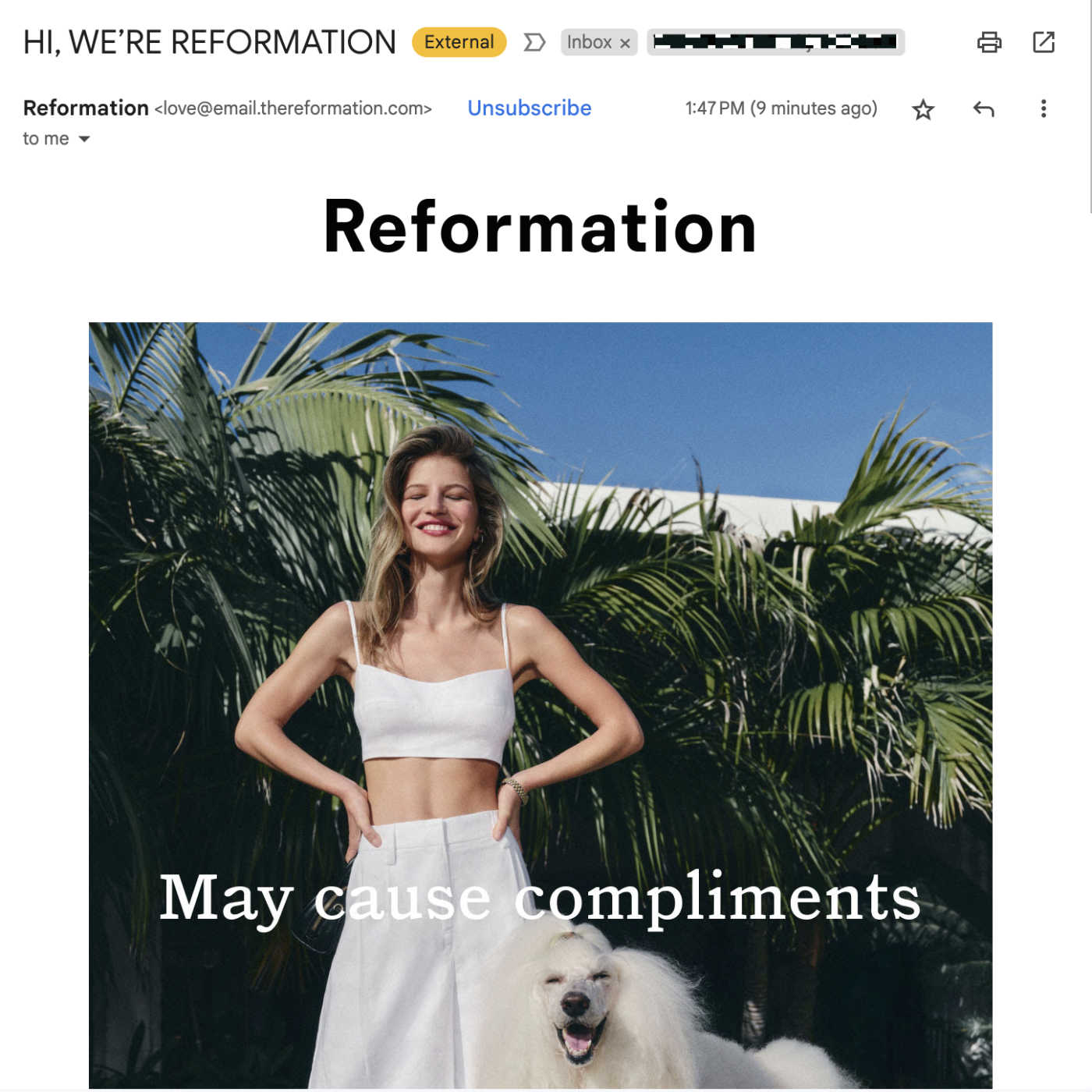
Welcome email marketing examples for B2C
When someone joins your email list, you’ve got one shot to make a stellar first impression. An automated welcome email series is one of the most impactful ways to onboard new subscribers and set expectations for what kind of content they’ll receive from you.
The language learning app Duolingo knows how important it is to keep users motivated and engaged from day one. That’s why, shortly after signing up, they send a welcome email with a simple tip for picking up a new language (do one lesson a day).
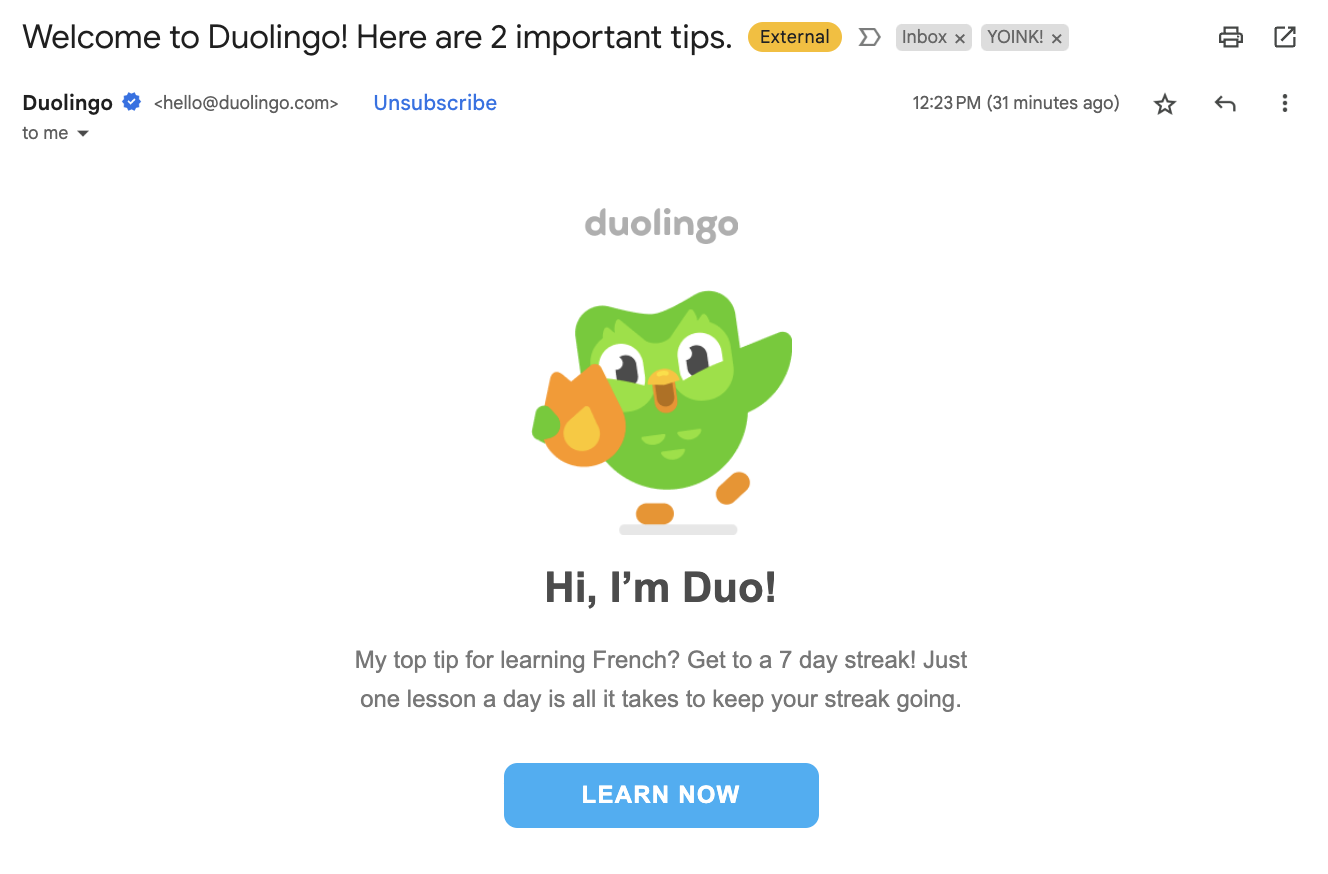
You can also include links to self-serve resources that help set your users up for success. For example, the AI scheduling app Reclaim.ai offers a list of quick tips to help users get the most out of their free trial.
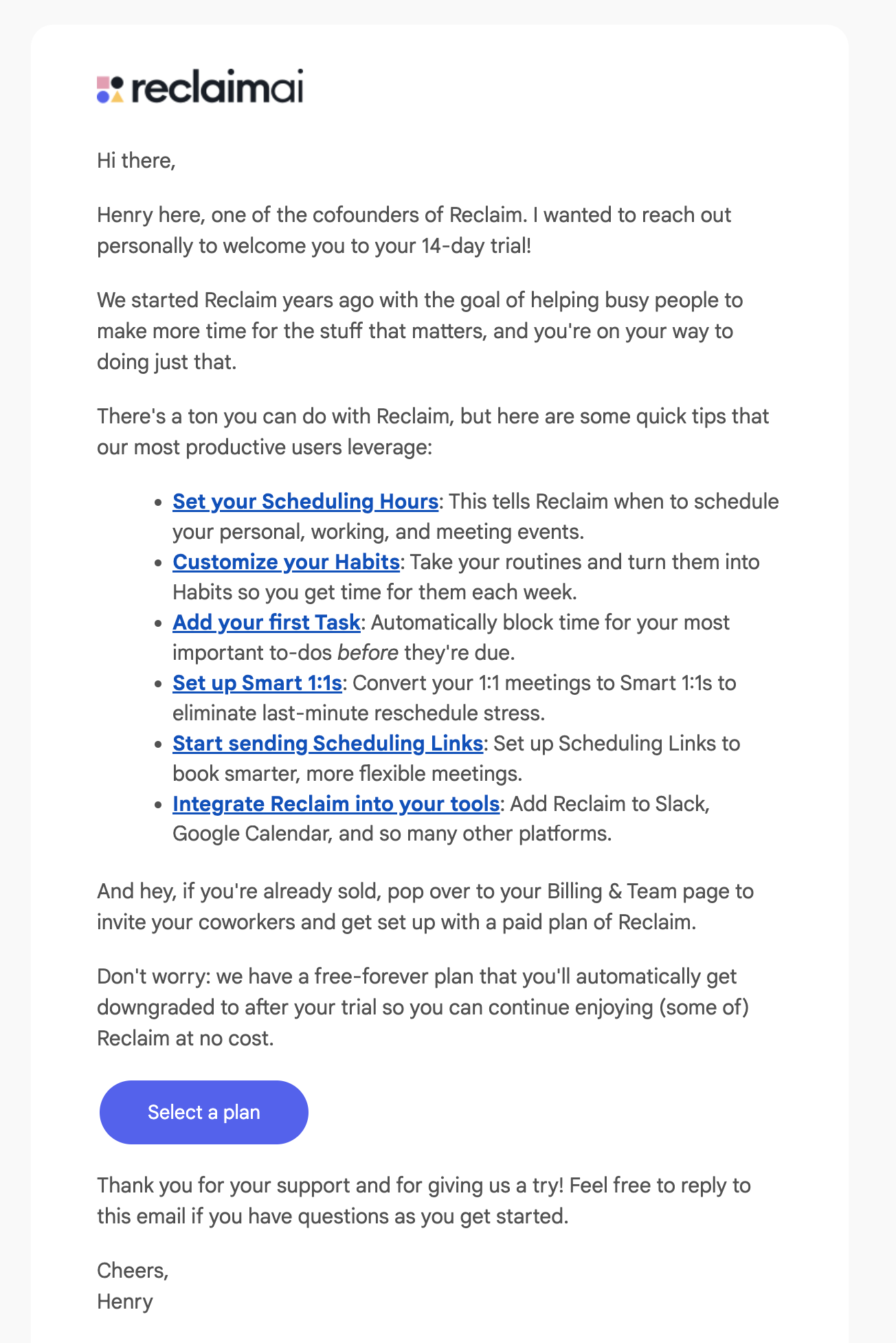
You can even send a welcome email when your product itself is an email newsletter. Take this example from the newsletter Link in Bio. It’s from the writer, which adds that human element right away, and includes links to some of her most popular newsletters. There’s also a gentle pitch to upgrade to a paid subscription.
But what I think is really smart is the last call-to-action: “Respond to this email with a ‘Hi!’ or simply move this email over to ‘Primary.'” Doing this ensures the newsletter doesn’t get relegated to the reader’s Spam folder and improves email deliverability.
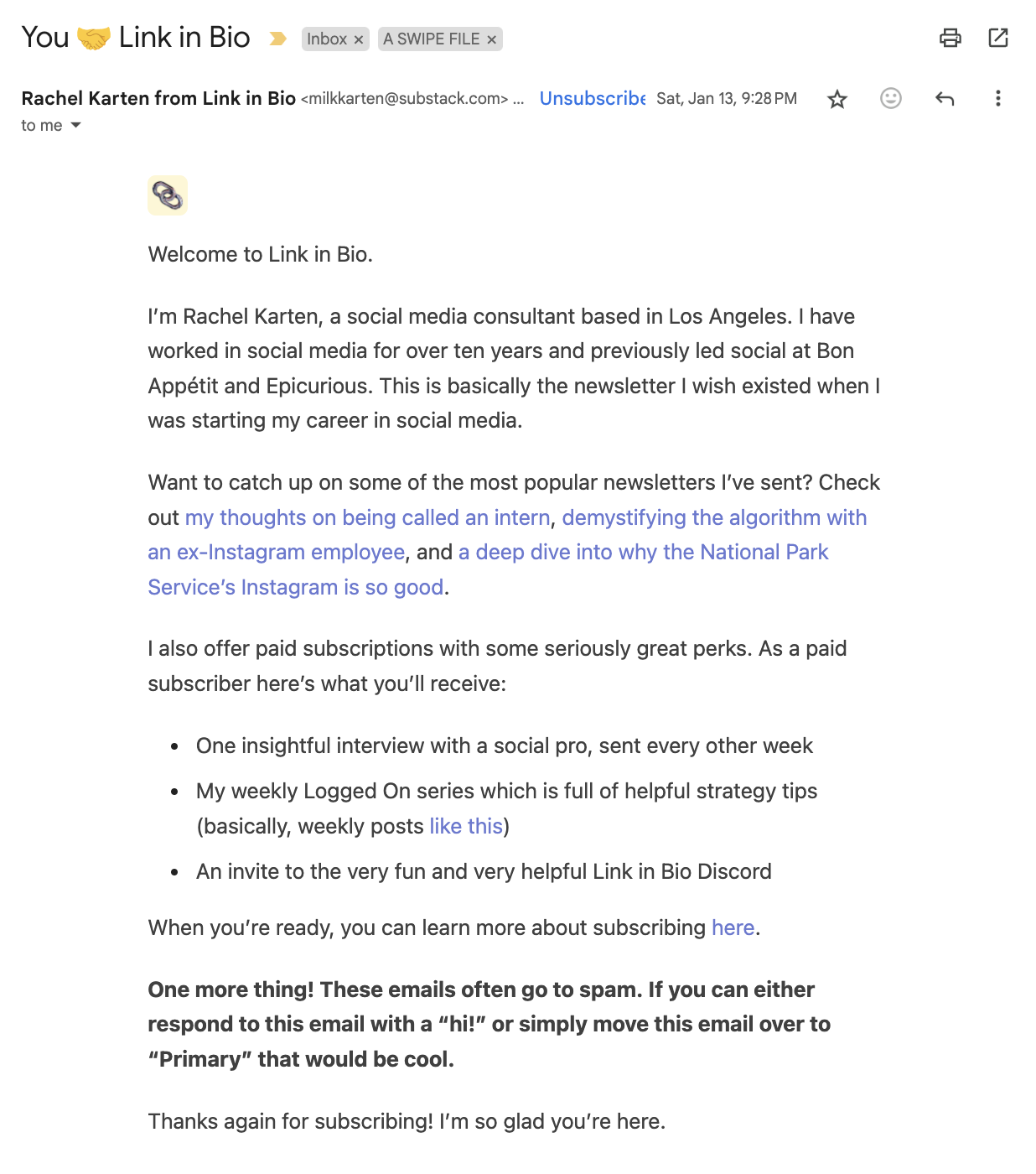
Welcome email marketing examples for eCommerce businesses
If you run an eCommerce business, you might have a mix of curious shoppers who have actively subscribed to your email list or have been added after completing a purchase. Either way, it’s clear that these subscribers’ interests are piqued. So ride that momentum by throwing in a special offer or exclusive content.
The skincare company Summer Fridays executes this strategy flawlessly in their welcome email. Most of the real estate is dominated by a beautiful display of their products, followed by a clear CTA, and a discount code.
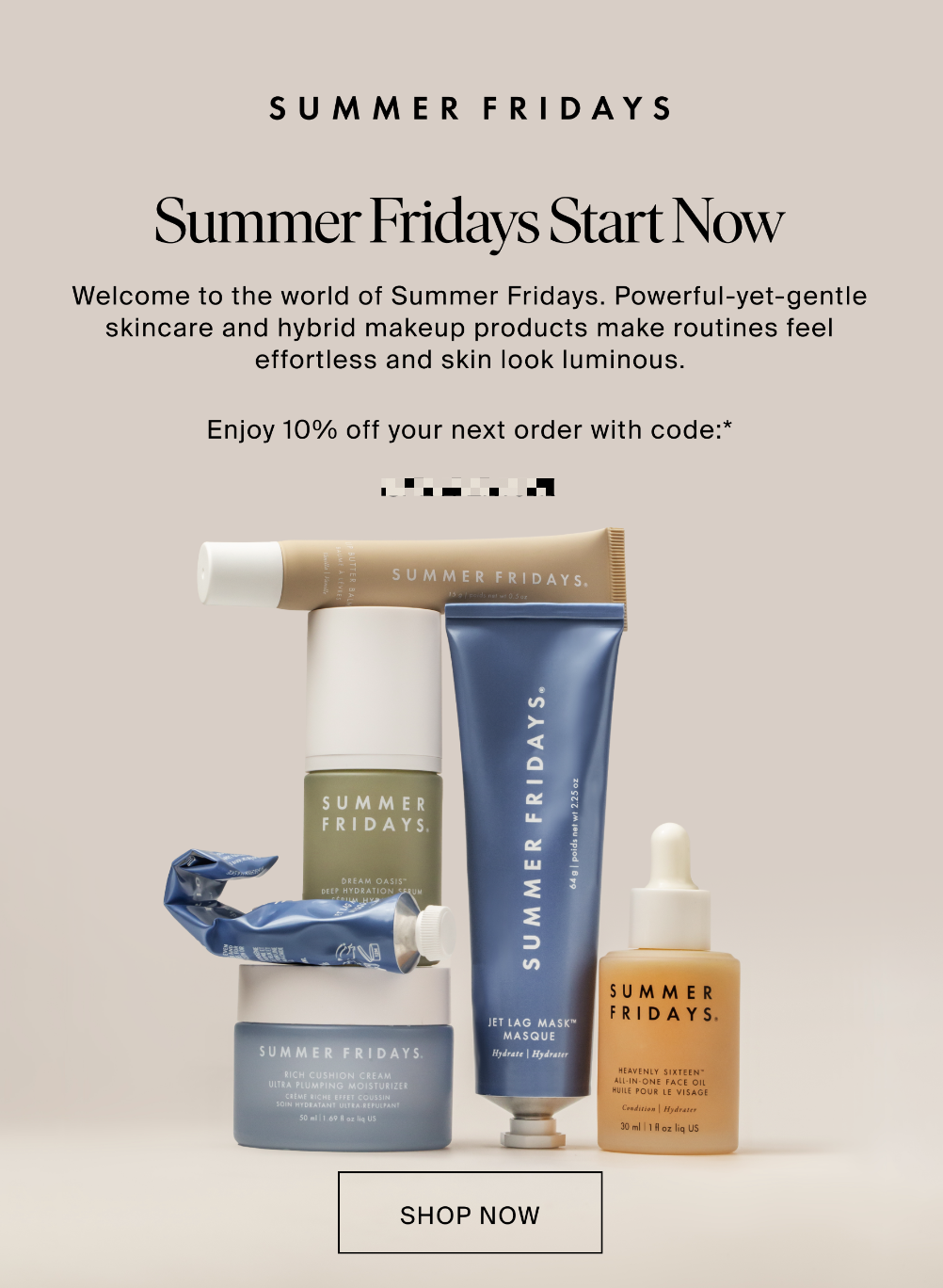
The luxury eyewear company Krewe also uses its welcome email to showcase customer reviews and invite recipients to follow the brand on Instagram. By growing its social media audience, Krewe gains another opportunity to get in front of its audience on a highly engaged platform.
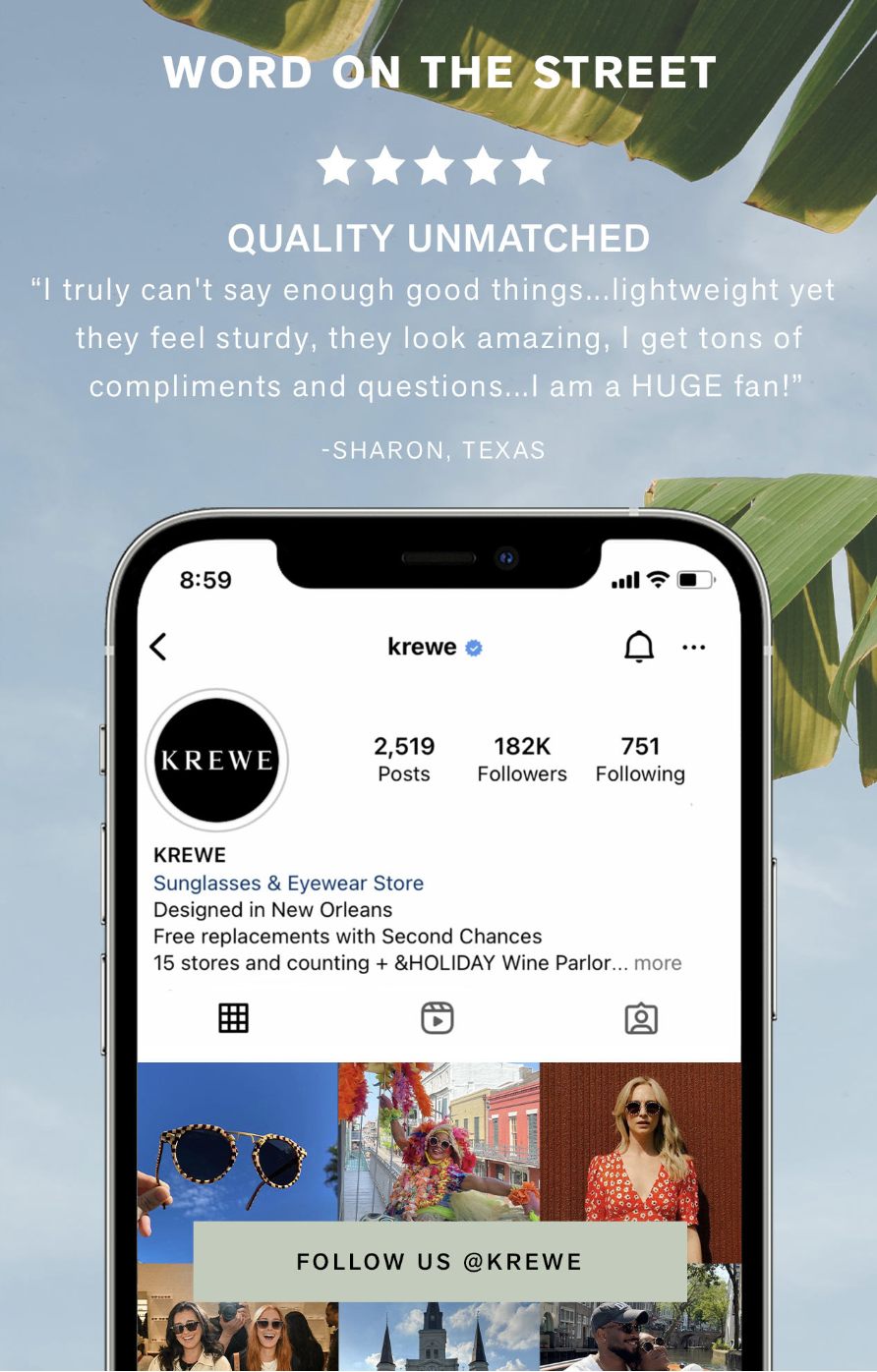
Opt-in email marketing examples
When it comes to building an email marketing list, quality trumps quantity every time. One of the best ways to cultivate a high-quality email list is to use a double opt-in process when collecting new emails. In a double opt-in, the person who signed up receives an email asking them to confirm that they want to sign up. Subscribers will receive your emails only after they click the link in that confirmation email.
If you’re going to keep one email simple, let it be this one. Similar to this example from Google, you want to reiterate your CTA (“confirm your email”) in the subject line and in the message itself.
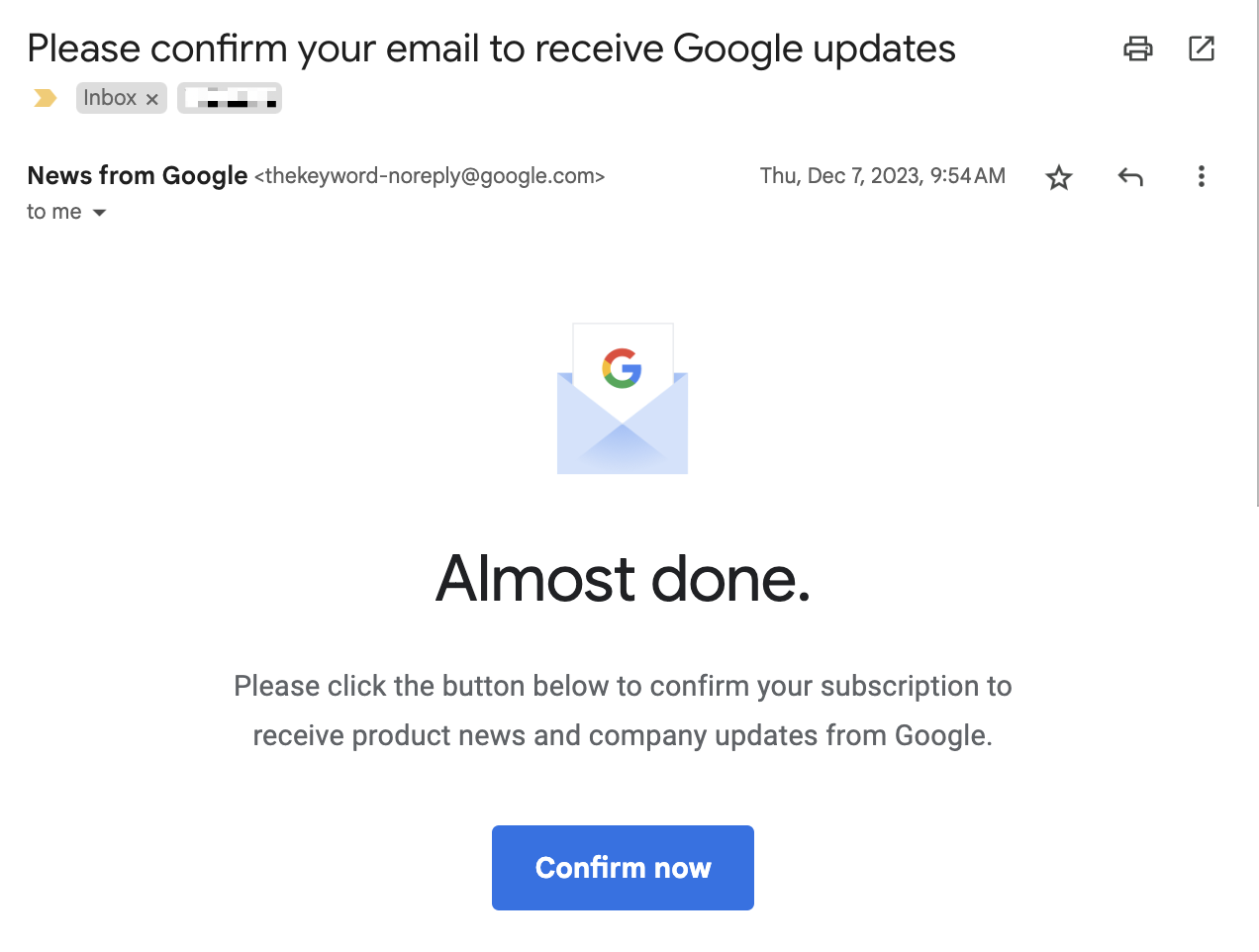
Here’s another double opt-in email I received when I signed up for a Substack newsletter. See? Simple.
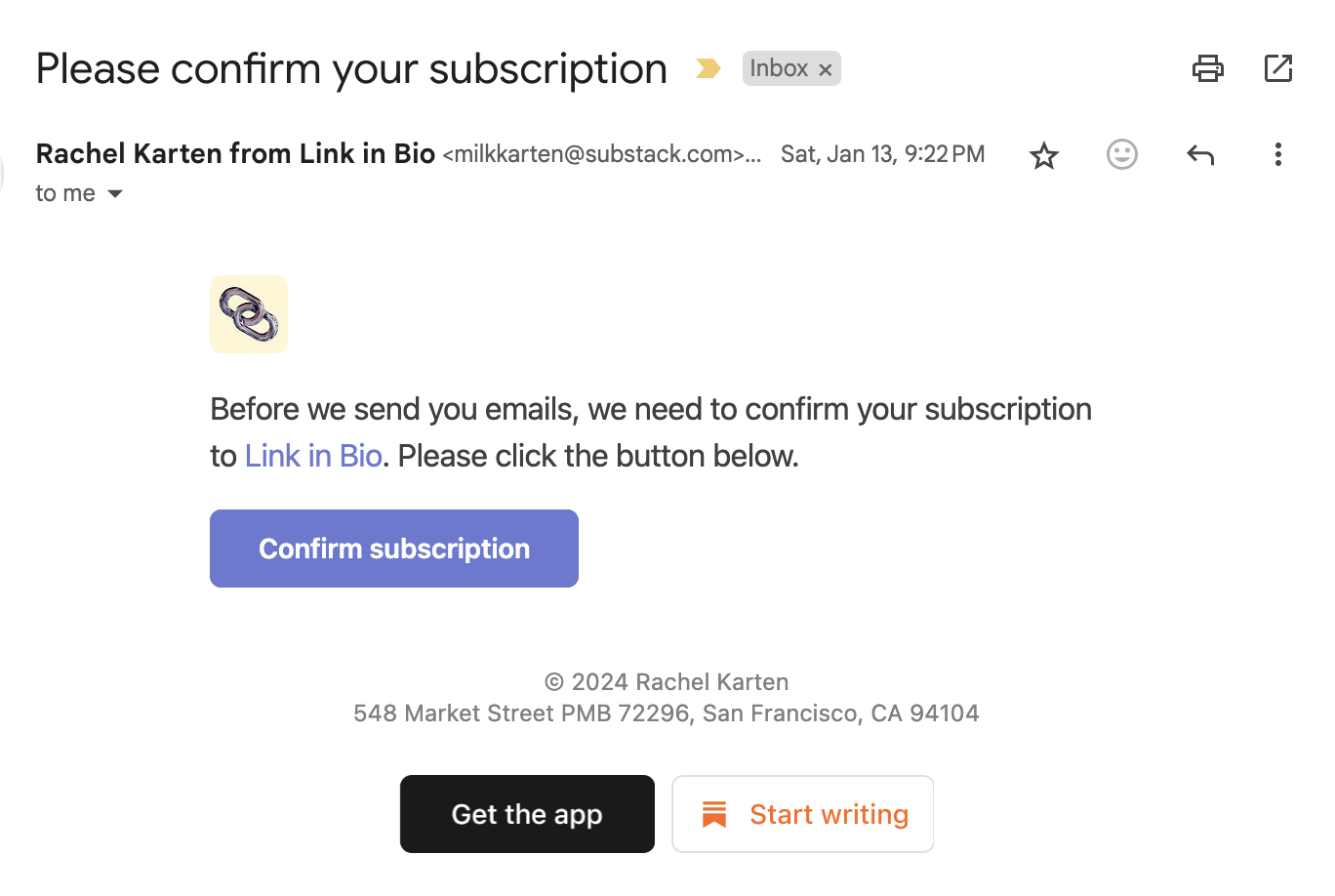
Product education email marketing examples
Product education emails do exactly as the name describes—they educate your readers on how your products will benefit them. This isn’t the time to do a long-form spiel the way you would in a blog post (but you can link to the blog post). Instead, highlight the key benefits in a visually appealing and easily skimmable format.
Take this example from the skincare company Dr. Idriss. It includes an infographic that illustrates how each product from their skincare line targets a specific problem to help the user achieve an even skin tone, along with links to shop each item.
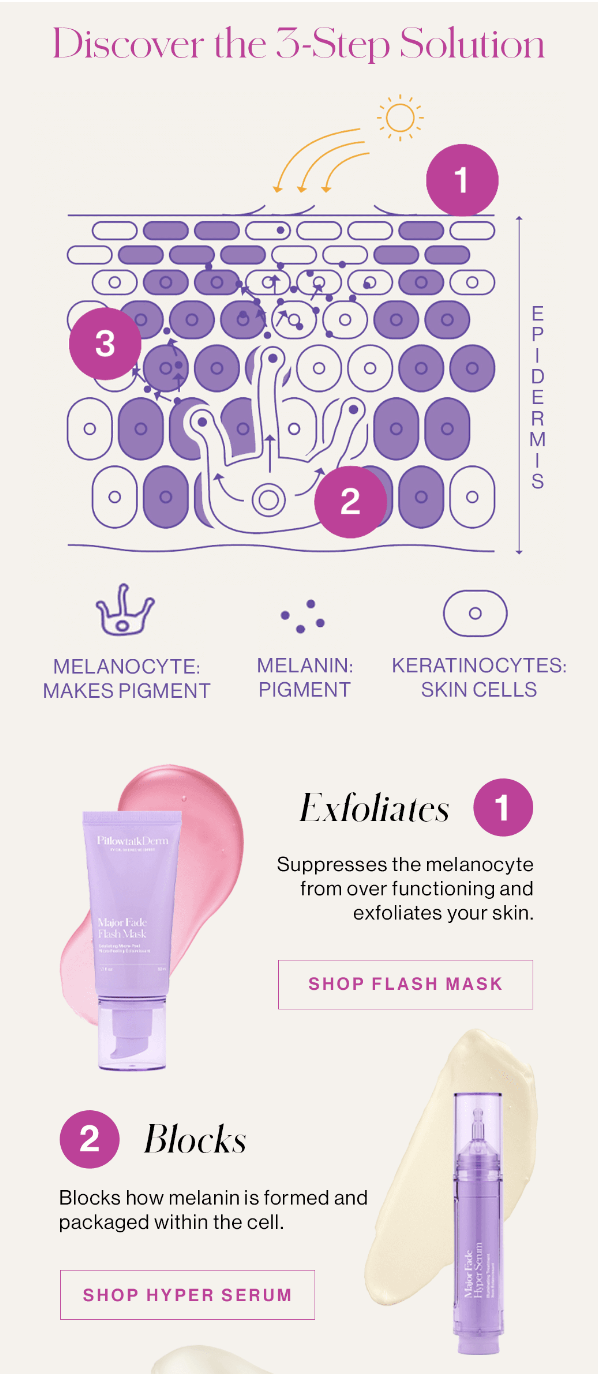
Here’s another example from the high-protein cereal company Magic Spoon. It’s got quite a bit of text, but they break it up nicely by grouping them into easily scannable blocks. Plus, they’ve sprinkled in some graphics (twinkling cereal) to keep the email visually on brand.
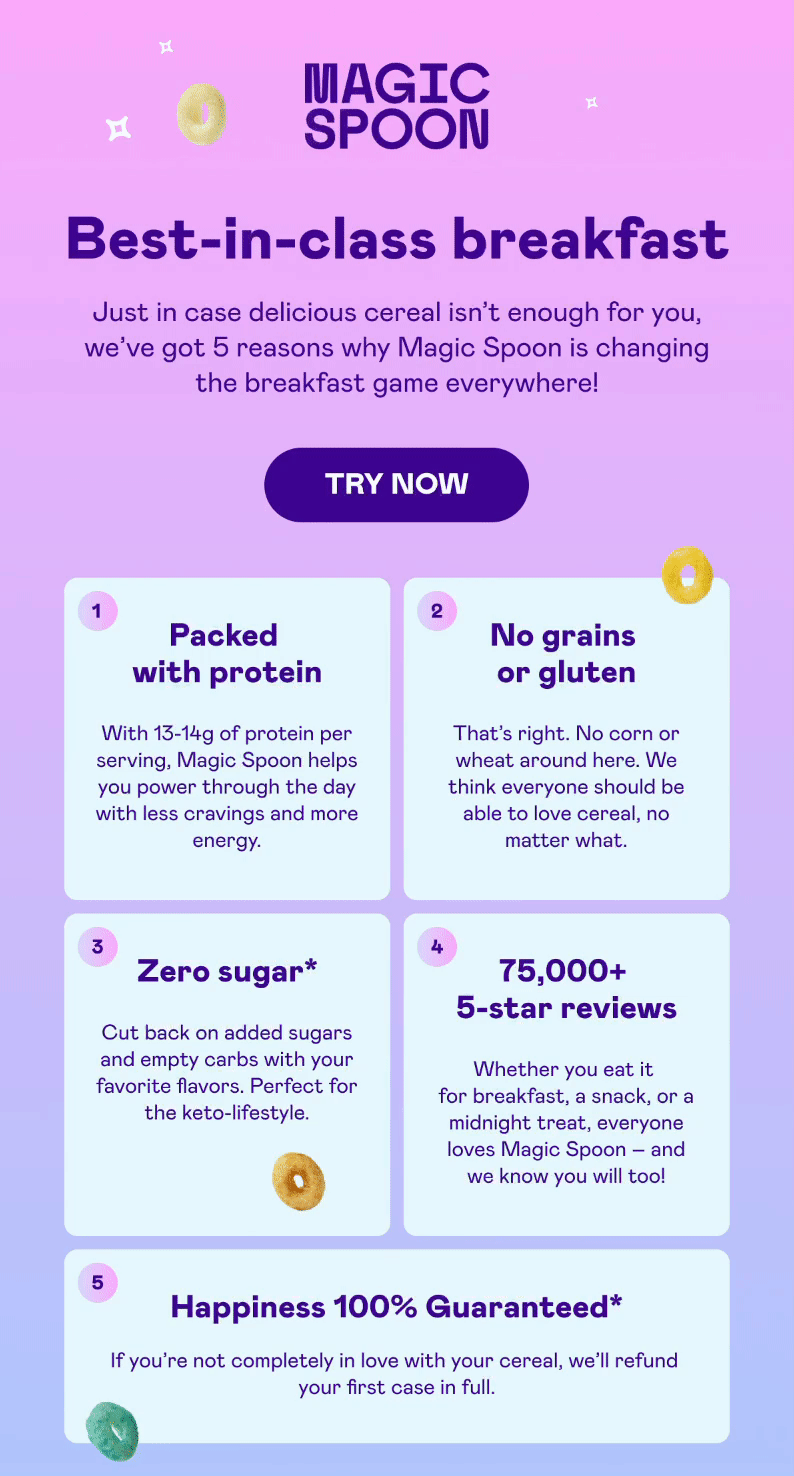
Product recommendation email marketing examples
While product education emails are educational first and promotional second, product recommendation emails are the opposite—they explicitly suggest content, services, or products based on things like wishlists, past purchases, and other content they’ve interacted with on your site.
Here’s an example from the sporting goods brand Salomon. In this case, I subscribed to get notified when the shoes I’d been eyeing for months were restocked. You’ll notice that the body copy includes the exact name of the product: XT-6 GORE-TEX. Salomon (correctly) assumed that that combination of letters and numbers would mean absolutely nothing to me, so they also included an image of the restocked item to help refresh my memory.
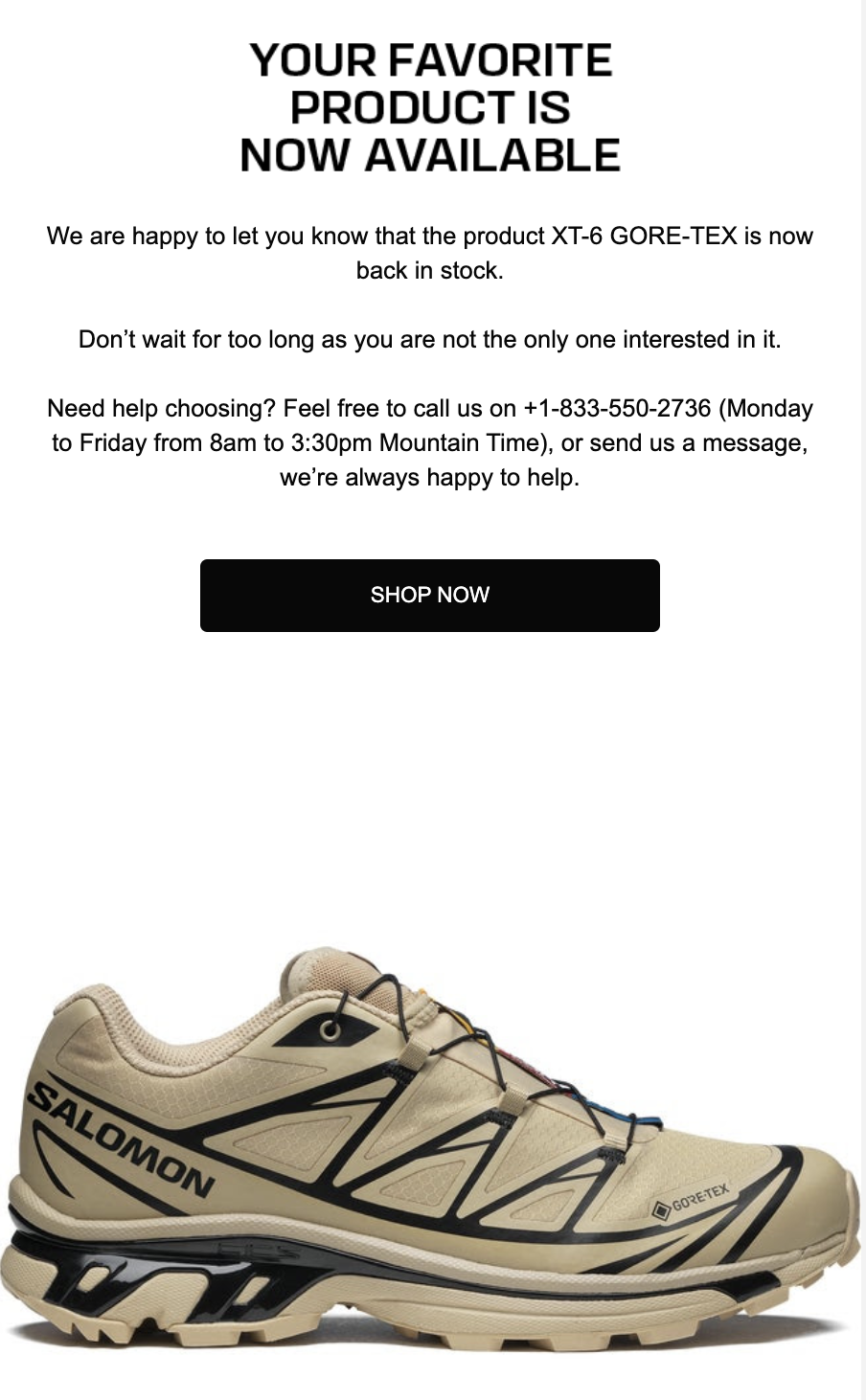
Not all eCommerce stores offer subscribers the ability to opt in to updates for specific products. But you can still drum up excitement when you restock items.
For example, I didn’t know anchovies had ever left Fishwife‘s shelves. But the way they’re presented in this email makes the return seem highly anticipated and, thus, something I want—nay, need—to try.
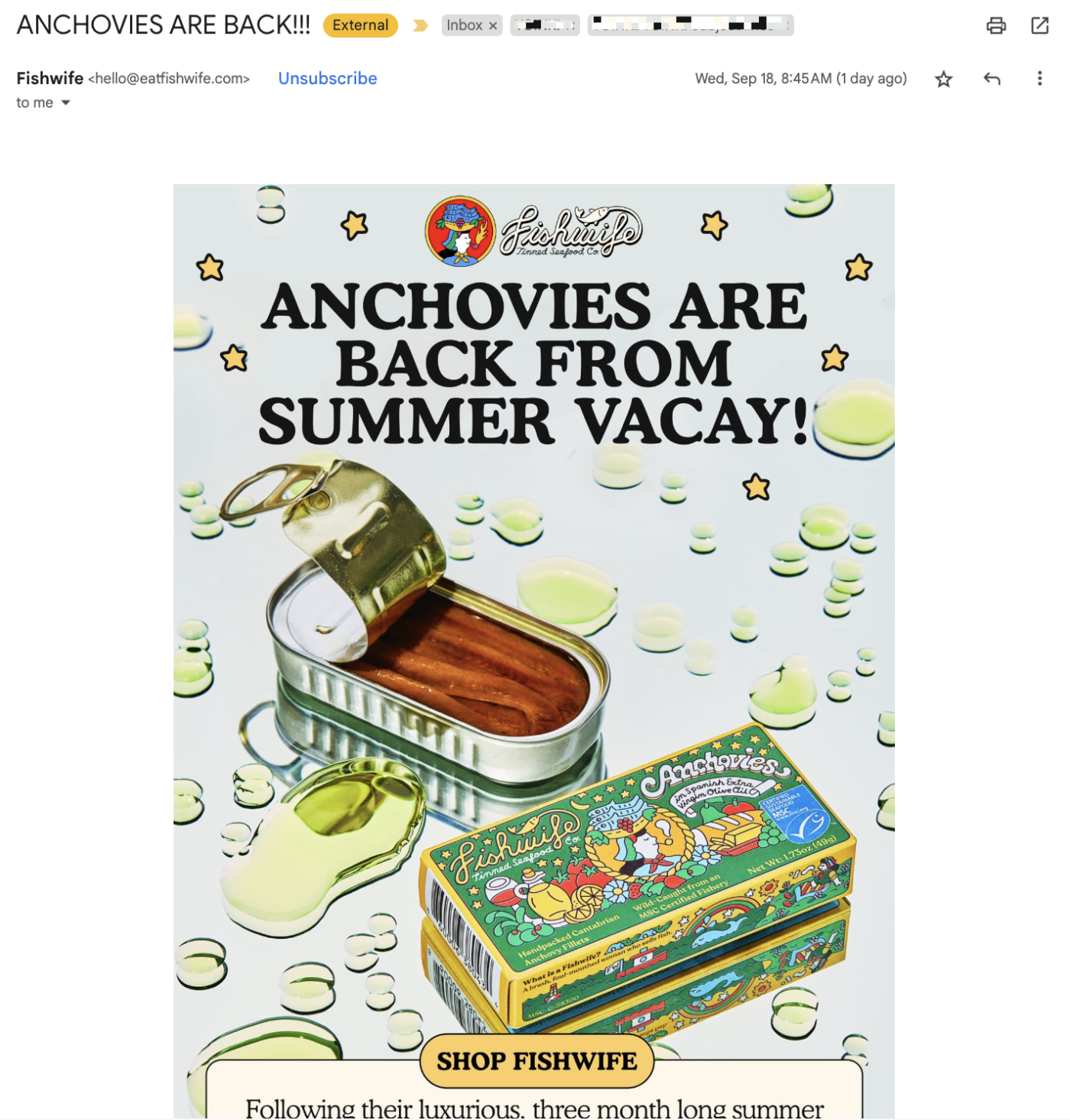
The product recommendation email examples above showcase only one product, but you can showcase more. Don’t go overboard, though—there’s a fine line between offering a few helpful suggestions and overwhelming your reader with too many choices.
For example, I’ve bought products from the apparel company Knix before, but never their bras. This email is trying to change that by suggesting a list of top-rated bras I might be interested in.
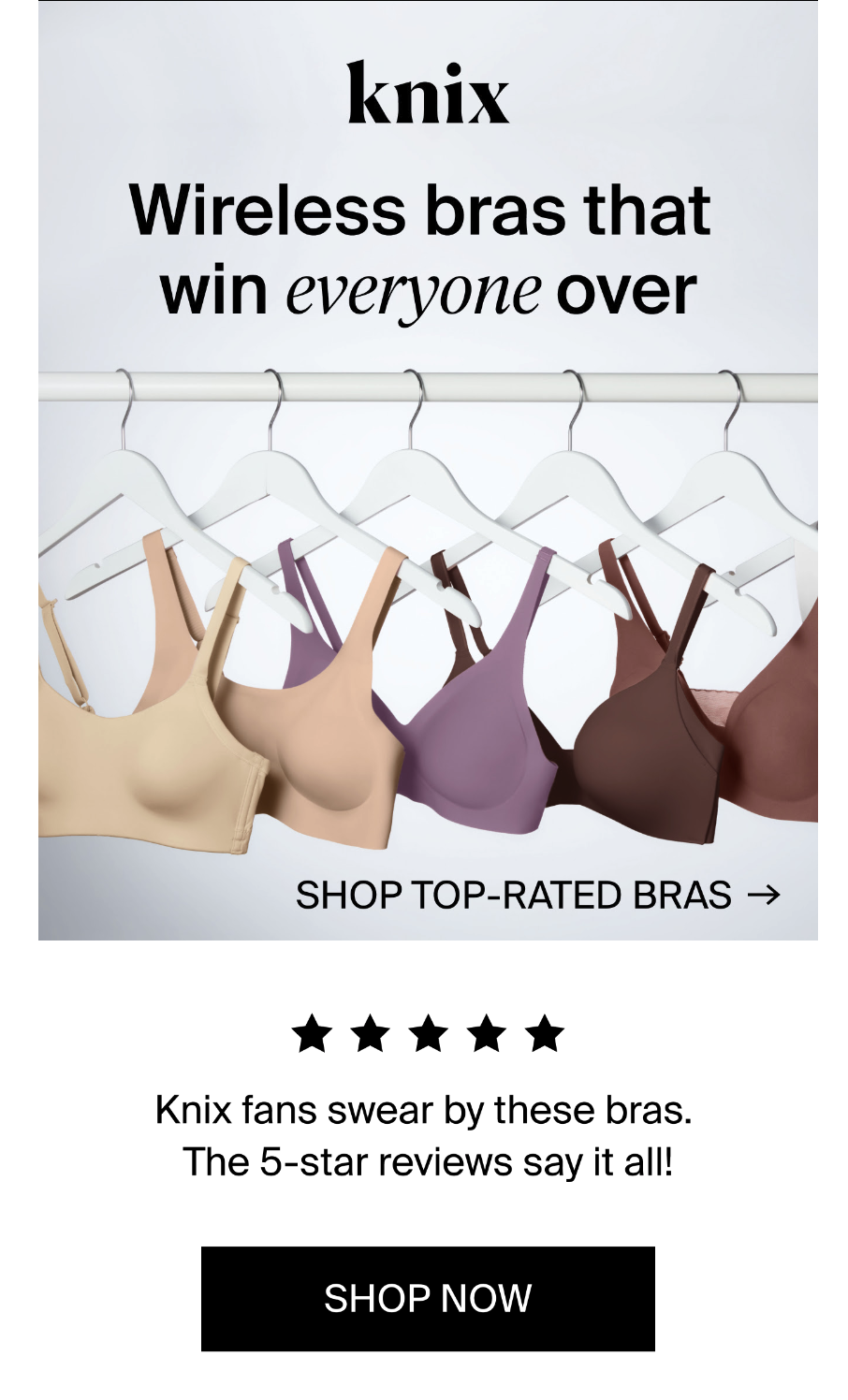
Seasonal or holiday campaign email marketing examples
Holidays and seasonal changes give you another opportunity to send tailored email sequences to engage your audience.
My local bookstore, Type Books, sends a holiday gift guide each year that makes it easy to figure out which books to add to my wishlist (or forward to my partner). They also include a discount code to encourage customers to support their shop on Small Business Saturday.
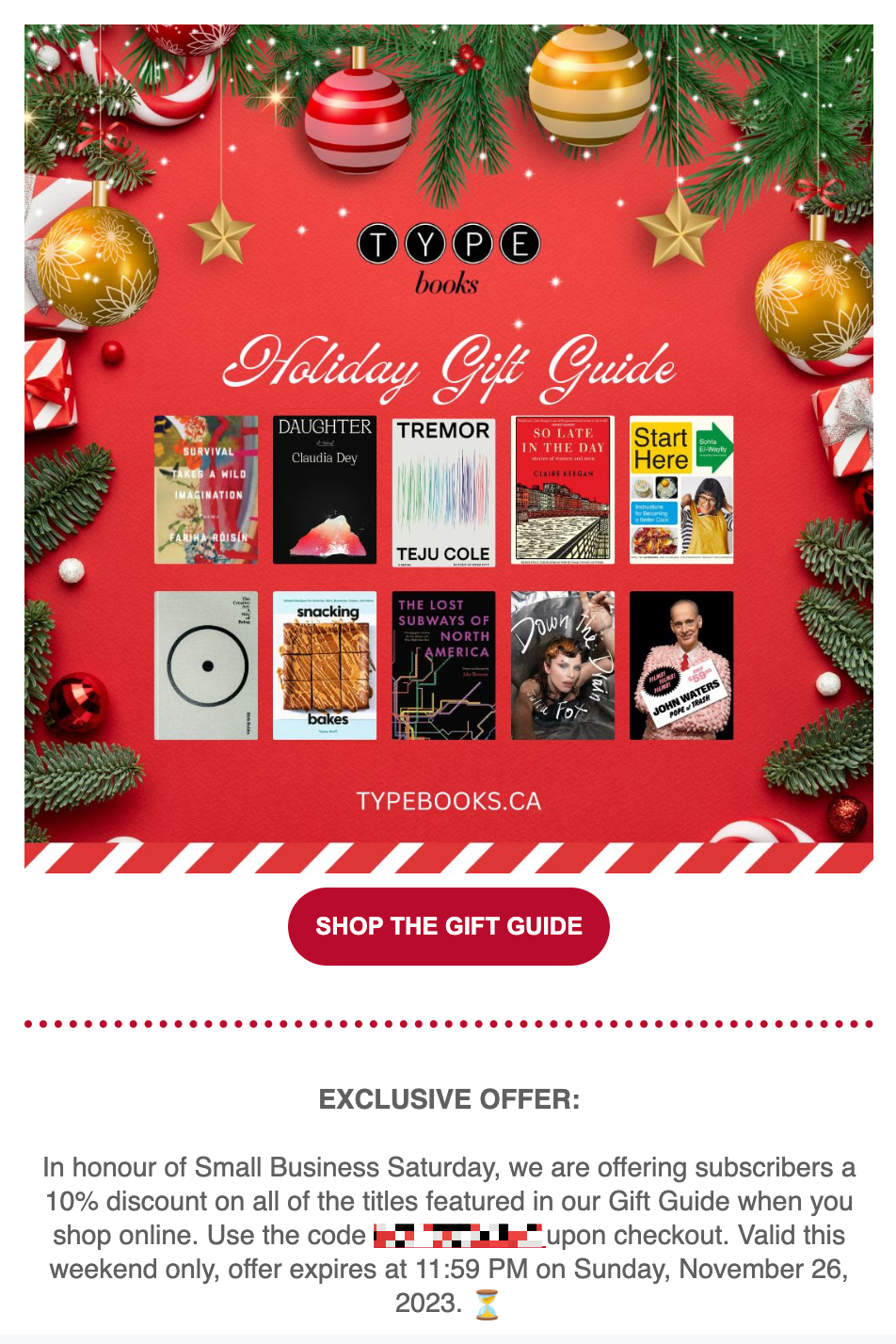
If your business releases certain products only around the holidays or a specific season, it’s a good idea to get these on your customers’ radars.
My favorite chocolate company, Chocolat de Kat, releases a limited batch of holiday advent calendars every year. Their pre-order email is quite possibly the only promotional email I look forward to on a yearly basis.
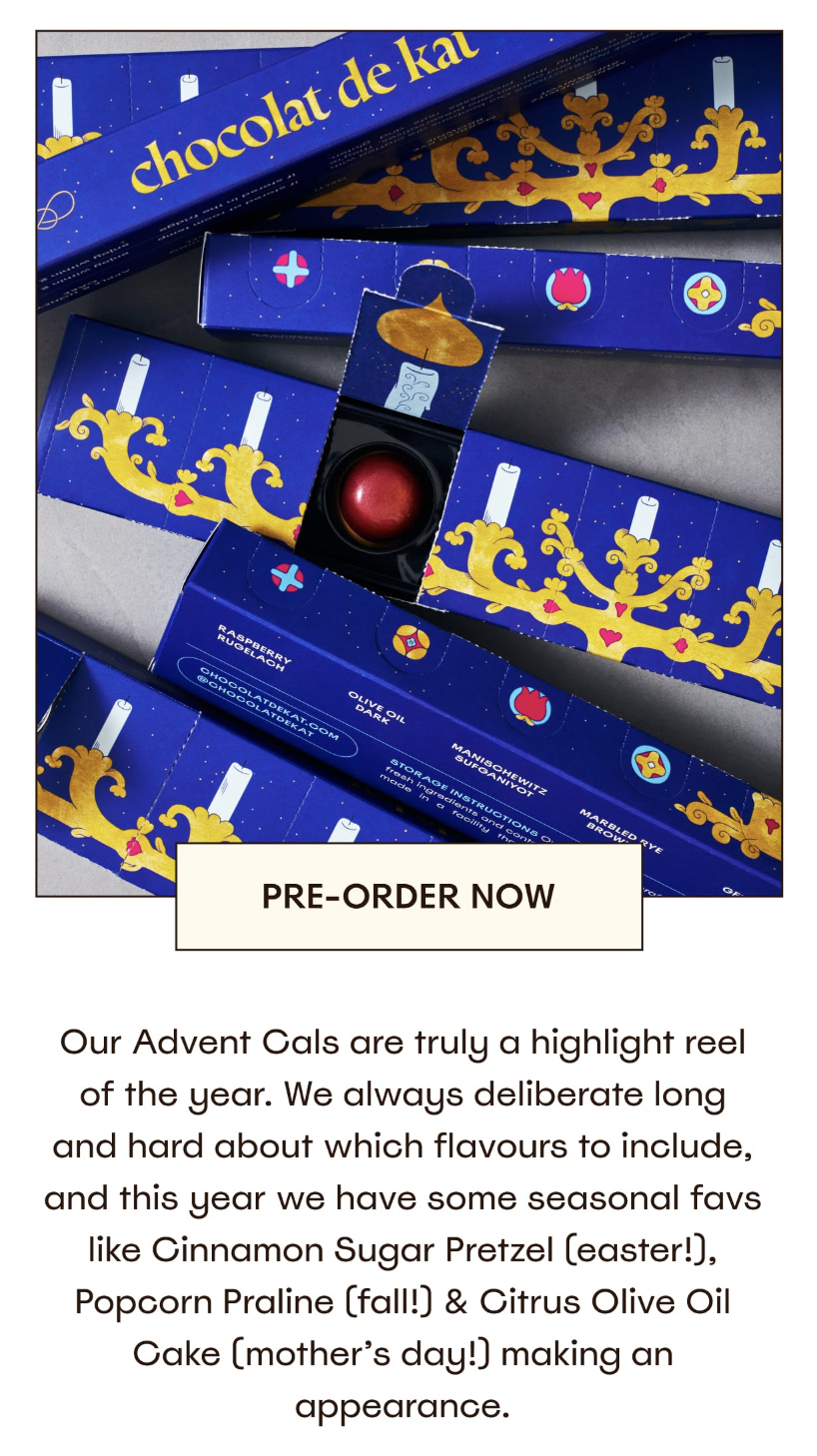
Re-engagement email marketing examples
Re-engagement emails are designed to recapture inactive subscribers who are in danger of unsubscribing (or “churning”). There are a number of approaches you could take to try to connect with them.
Duolingo has developed a reputation for pushing the boundaries with its marketing tactics—and it works for them. Slightly passive-aggressive language, like the one used in this email (“Hi, it’s Duo. Again. Still here, reminding you to practice”), playfully guilts me into jumping back into the app.
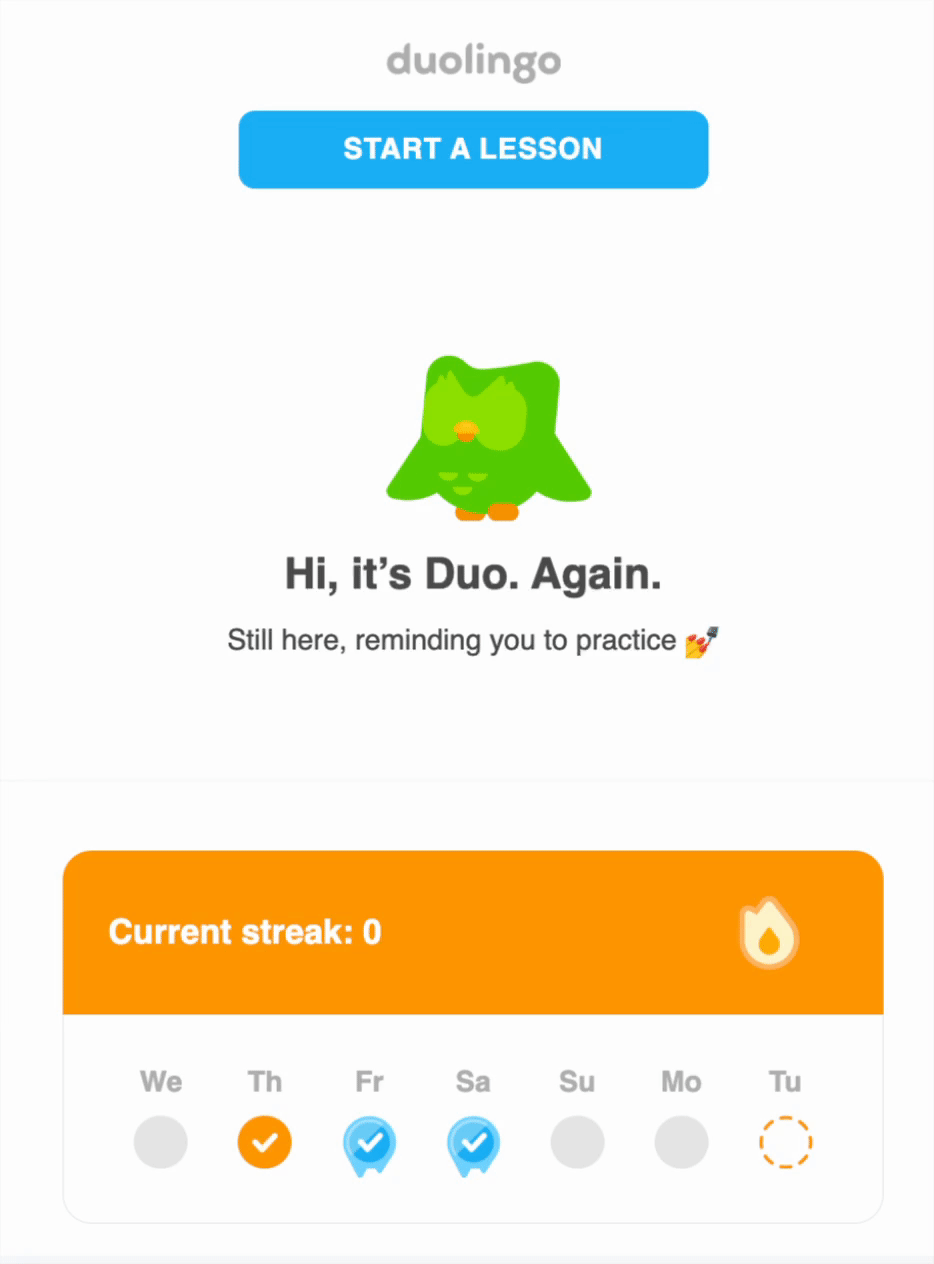
Not all brands can get away with that kind of cheekiness, though.
If “irreverent” isn’t in your brand’s voice style guide, you could go in with a softer touch—like this example from the clothing brand Levi’s. The language is direct and the visual is dynamic, making it more likely to catch your attention. Plus, it includes a unique discount code to incentivize you to re-engage.
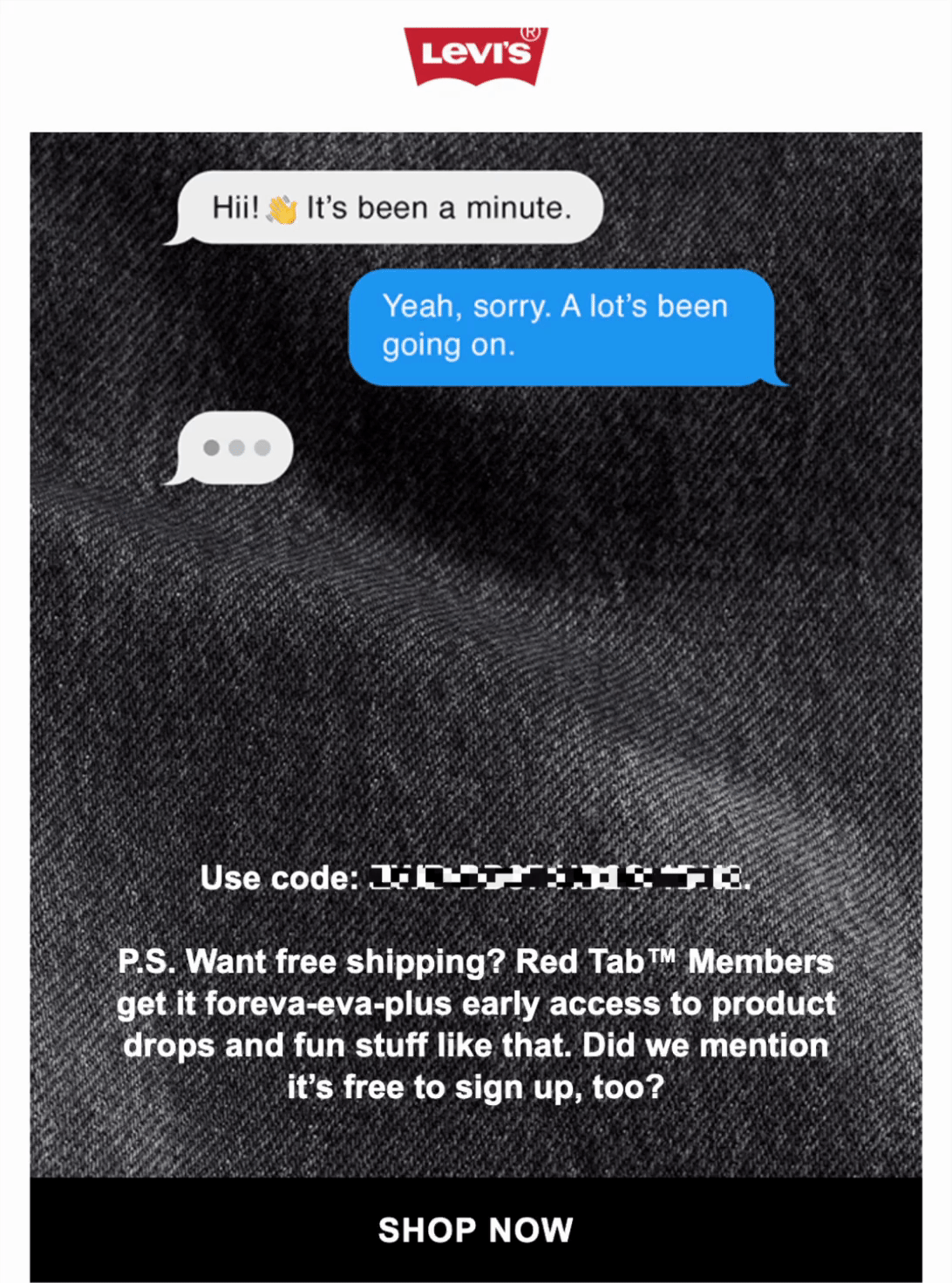
The fitness membership app ClassPass uses a similar strategy, but it takes it one step further: it also highlights the benefits you’ll get after re-engaging with the app (“more reps, more stretch, more variety, more fun”).
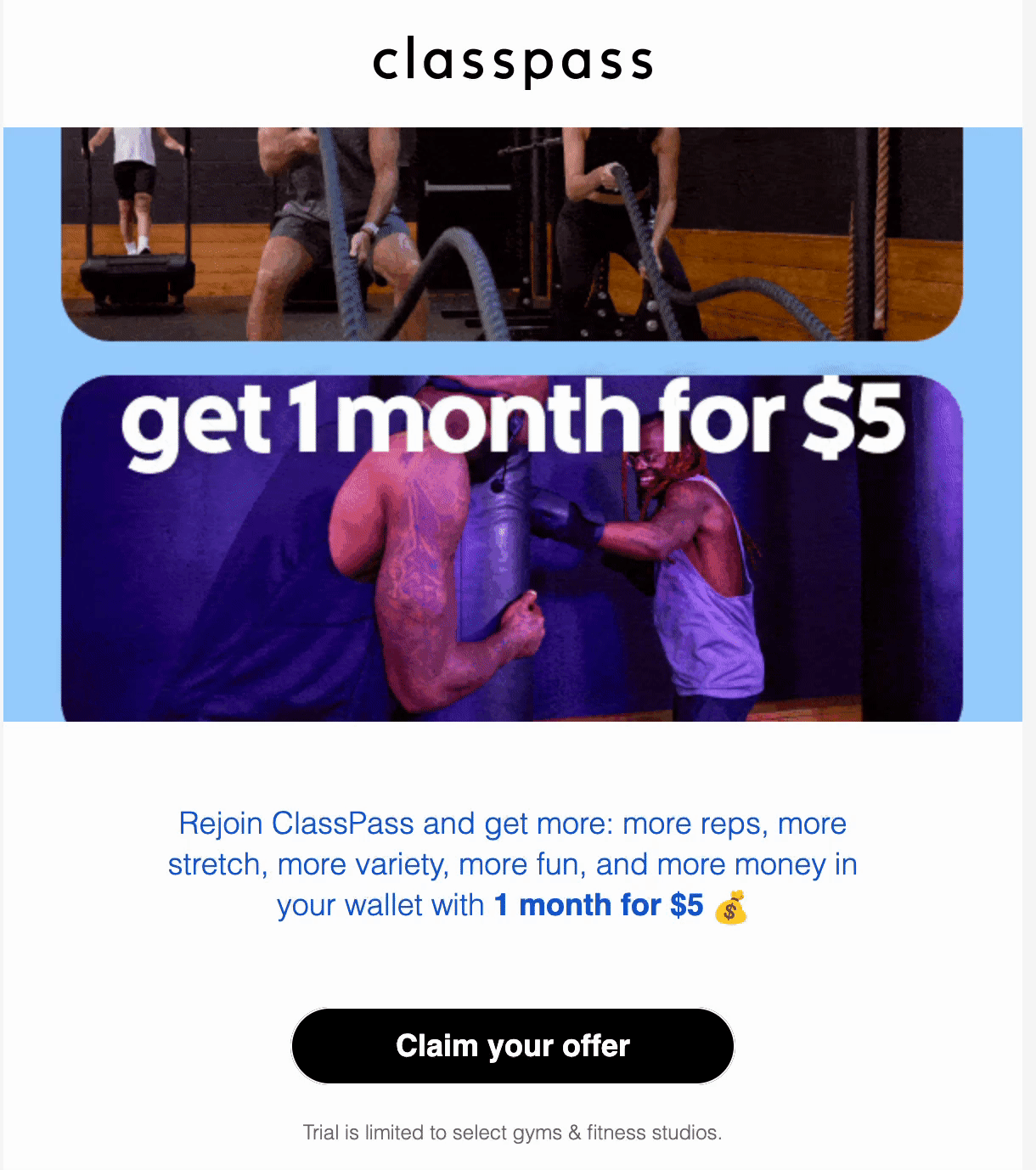
Abandoned cart email marketing examples
There are a million reasons why people don’t click “Checkout” despite a fully loaded virtual cart. Maybe they needed to wait until payday and then forgot. Or the right option for their tastes was out of stock. Following up is a great way to float your way back to the top of their inbox and their minds.
This abandoned cart email from Graza—an olive oil company—nails the follow-up: it shows the items I left in my cart and includes a persuasive CTA (“Finish shopping”). It even tries to sweeten the deal with a code for free shipping.
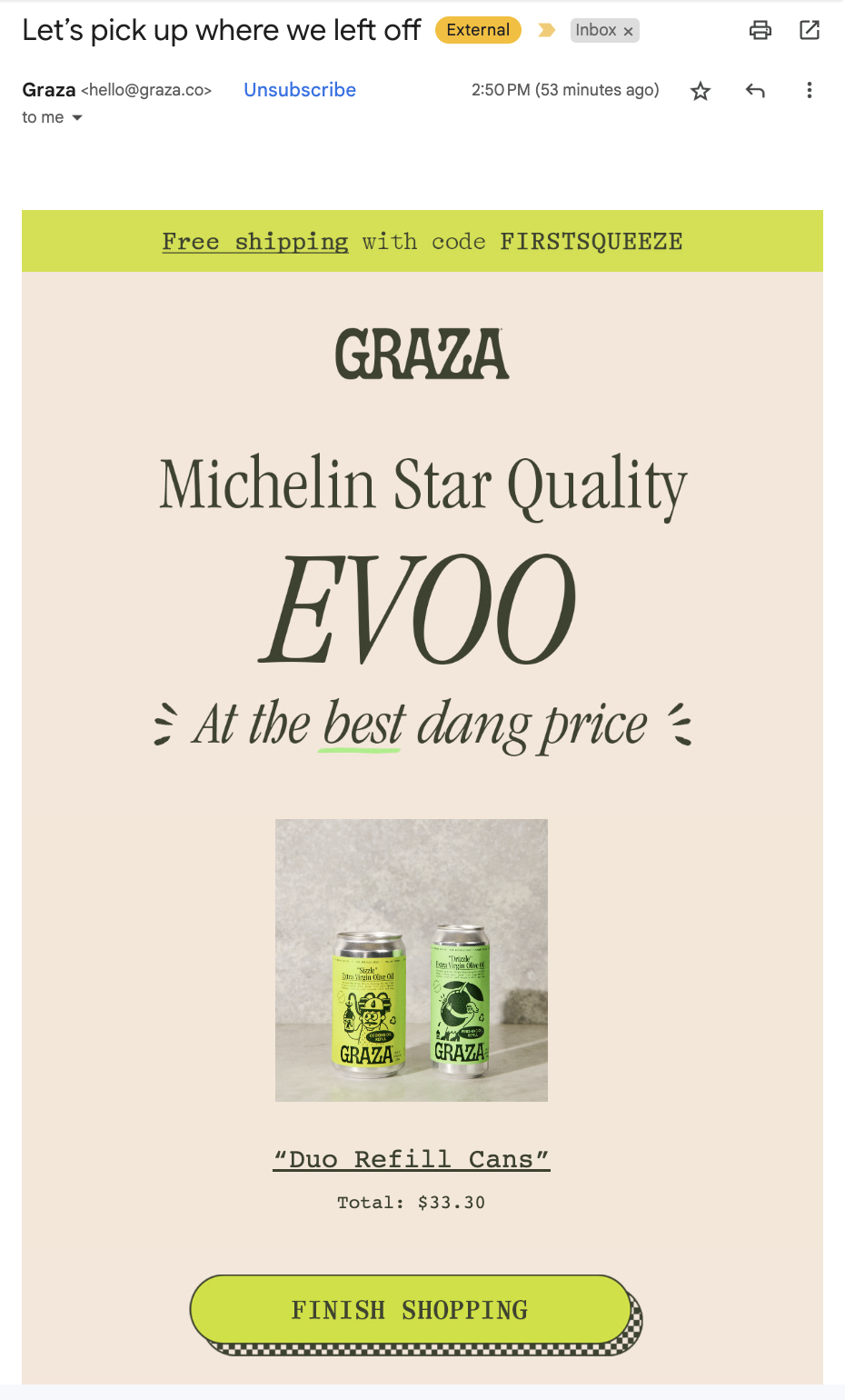
Magic Spoon doesn’t just remind you that there are items sitting in your cart—it includes an animated GIF of a cursor clicking the CTA, which has the effect of making you want to mirror that action.
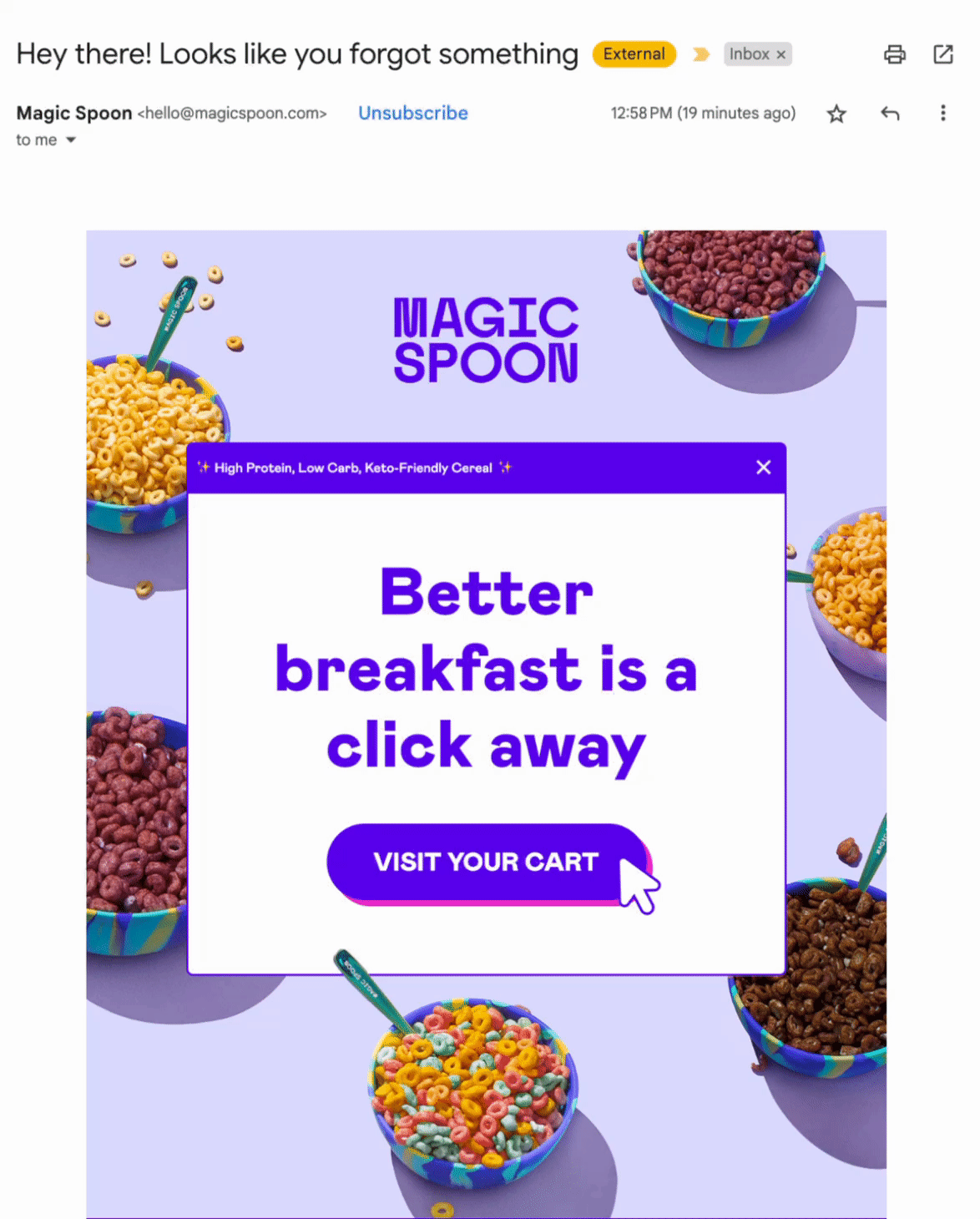
If your budget doesn’t stretch far enough to include fancy animations or highly produced visuals, that’s ok. Plain text emails can be just as effective if you know how to craft a compelling message.
Here’s an example of a plain text email from Magic Spoon. Even if you only skim the message, the CTA (“grab that pack you’ve been eyeing”) still stands out and reminds you to complete the purchase.
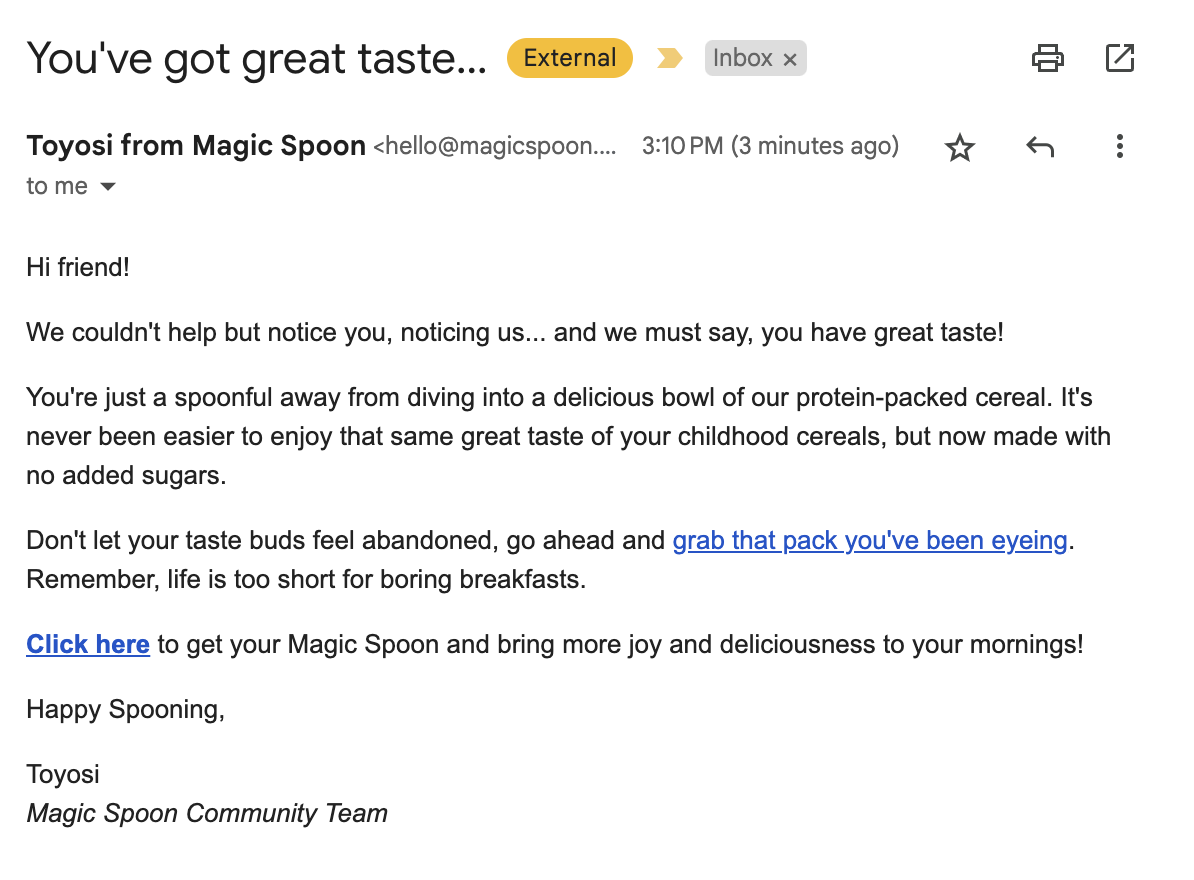
Order confirmation email marketing examples
Every time a customer makes an order, you should be sending an email to confirm that their purchase went through. You’ll want to include an order summary and a CTA inviting them to continue browsing your site (you want repeat business, after all).
The email can be as simple as you want—much like what the hotel company AutoCamp did in this example. It includes a quick thank you, the pertinent details of my booking, and an invitation to check out another one of their landing pages, which allows you to book experiences like bike rides and stargazing tours with the company.
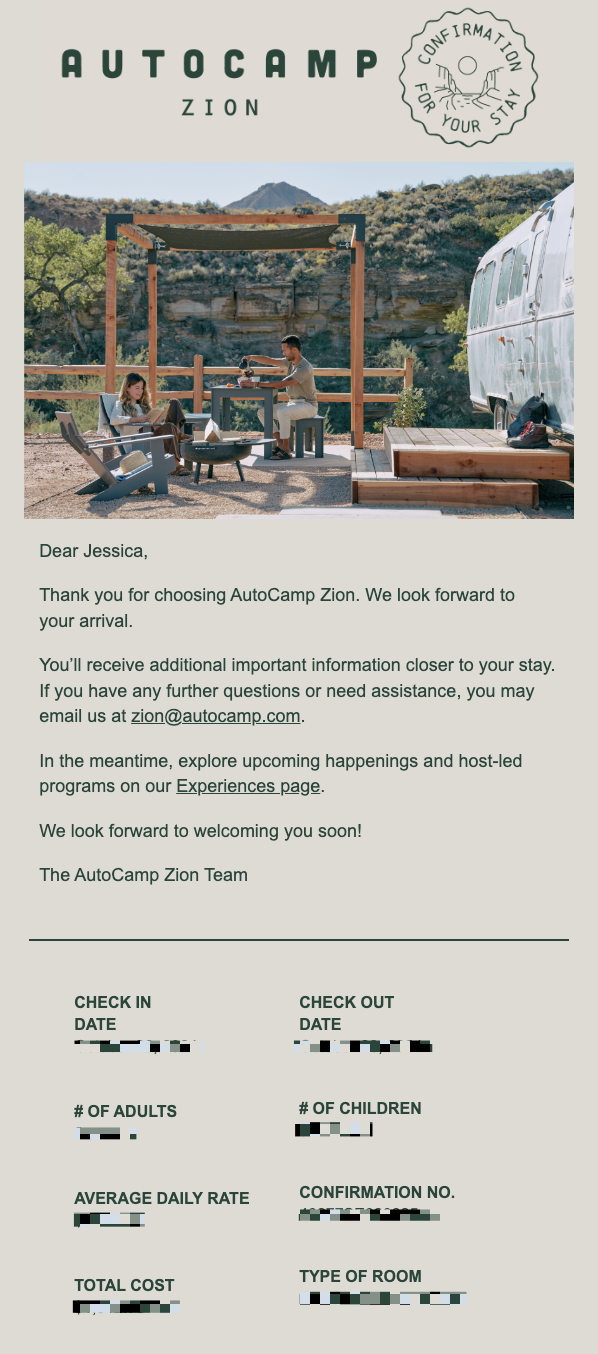
Your order confirmation doesn’t need flashy graphics or creative body copy. But a little creativity never hurt anyone. The extra brand flair in this confirmation email from Magic Spoon stirred up even more excitement to receive my order.
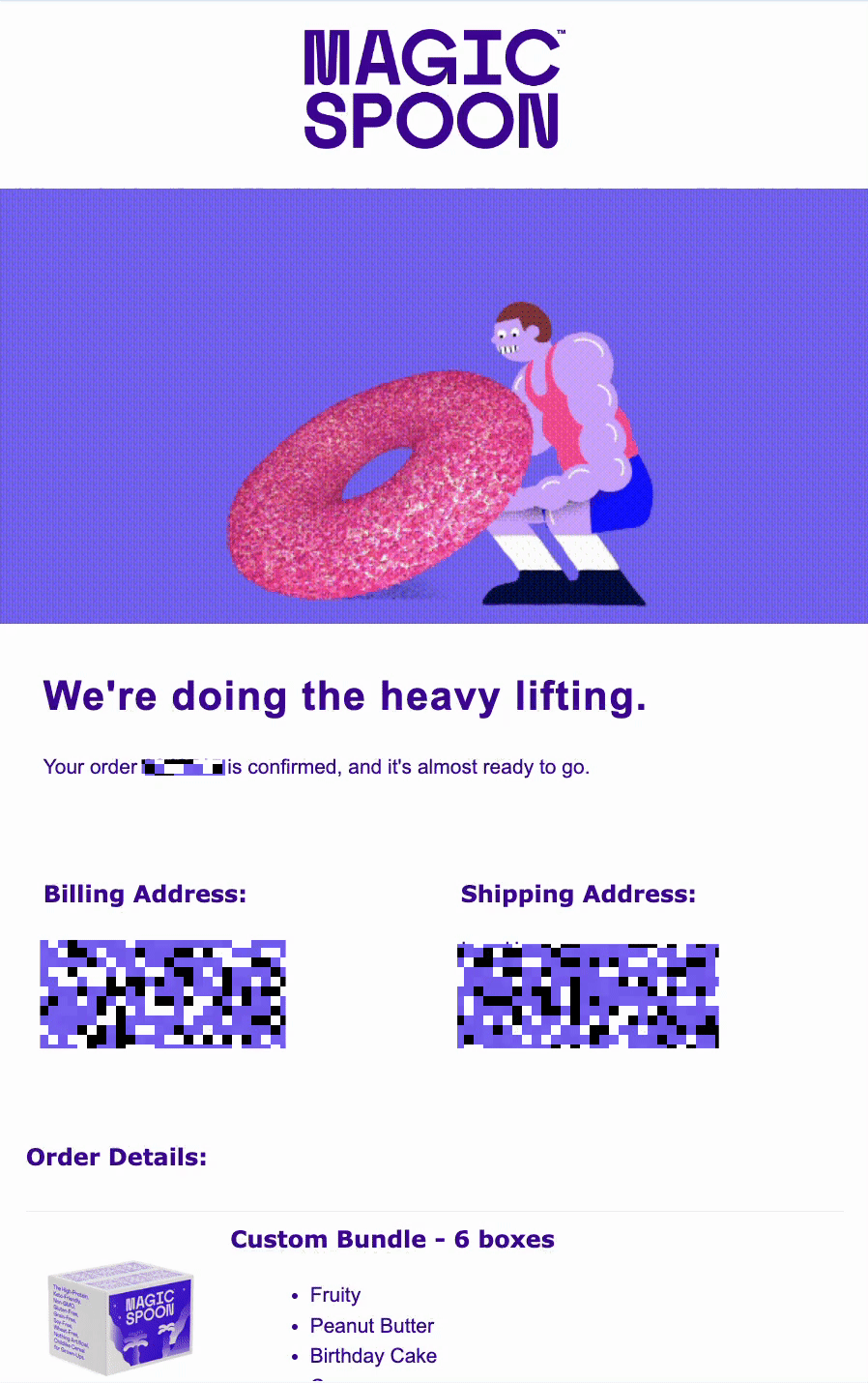
Feedback request email marketing examples
Email marketing can be a two-way conversation. While your emails should mainly serve subscribers, you can also use them for research. Software review site G2 noticed some of their listings didn’t have as many reviews, so they sent an email asking for feedback. They also offered a $10 Amazon gift card to incentivize users to click the CTA and share their thoughts.
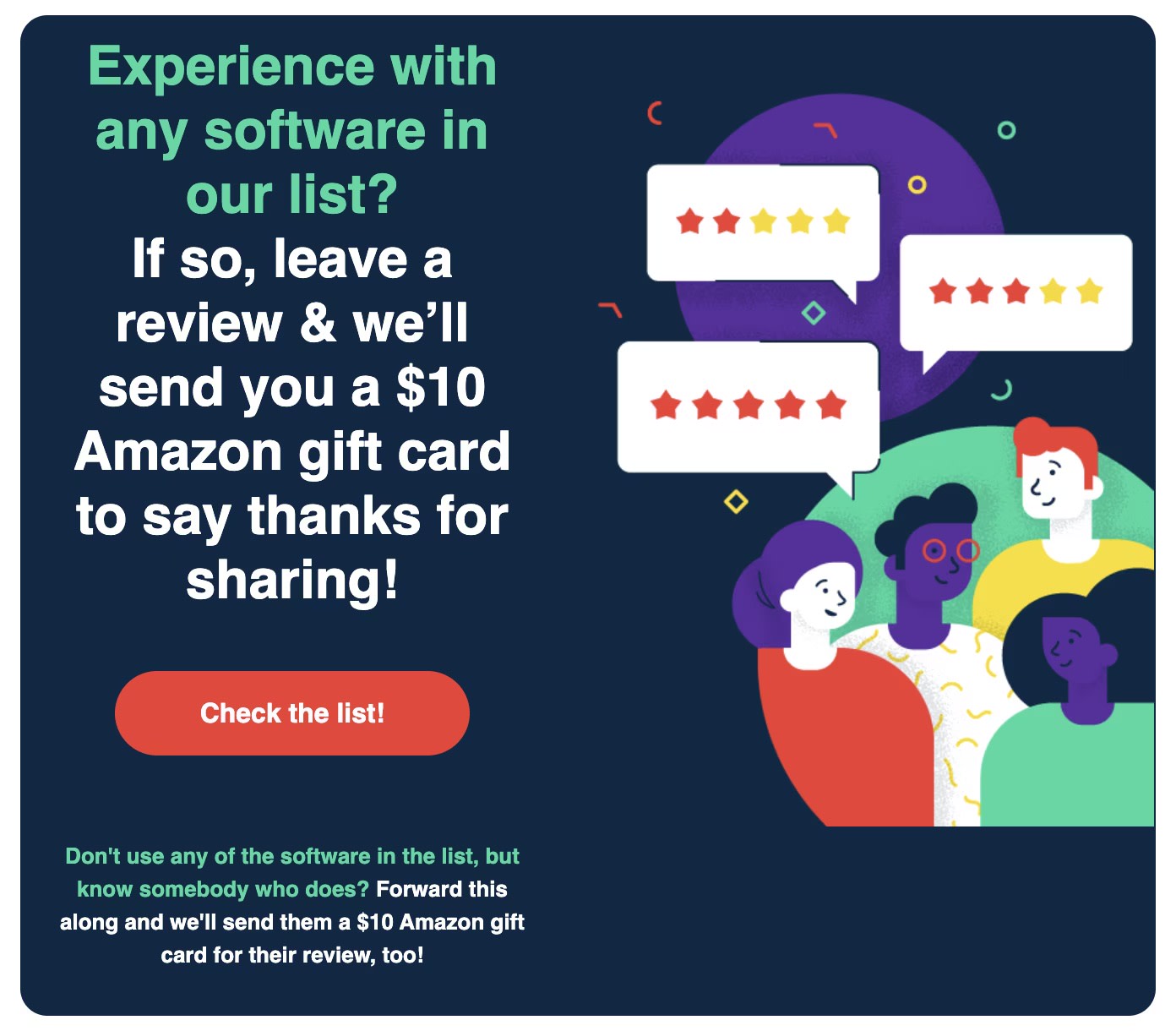
Office furniture company Branch used a similar strategy by offering me a $10 coupon to use on my next purchase. It also allowed me to share my product rating and feedback directly in the email, making it that much more convenient to leave a review.
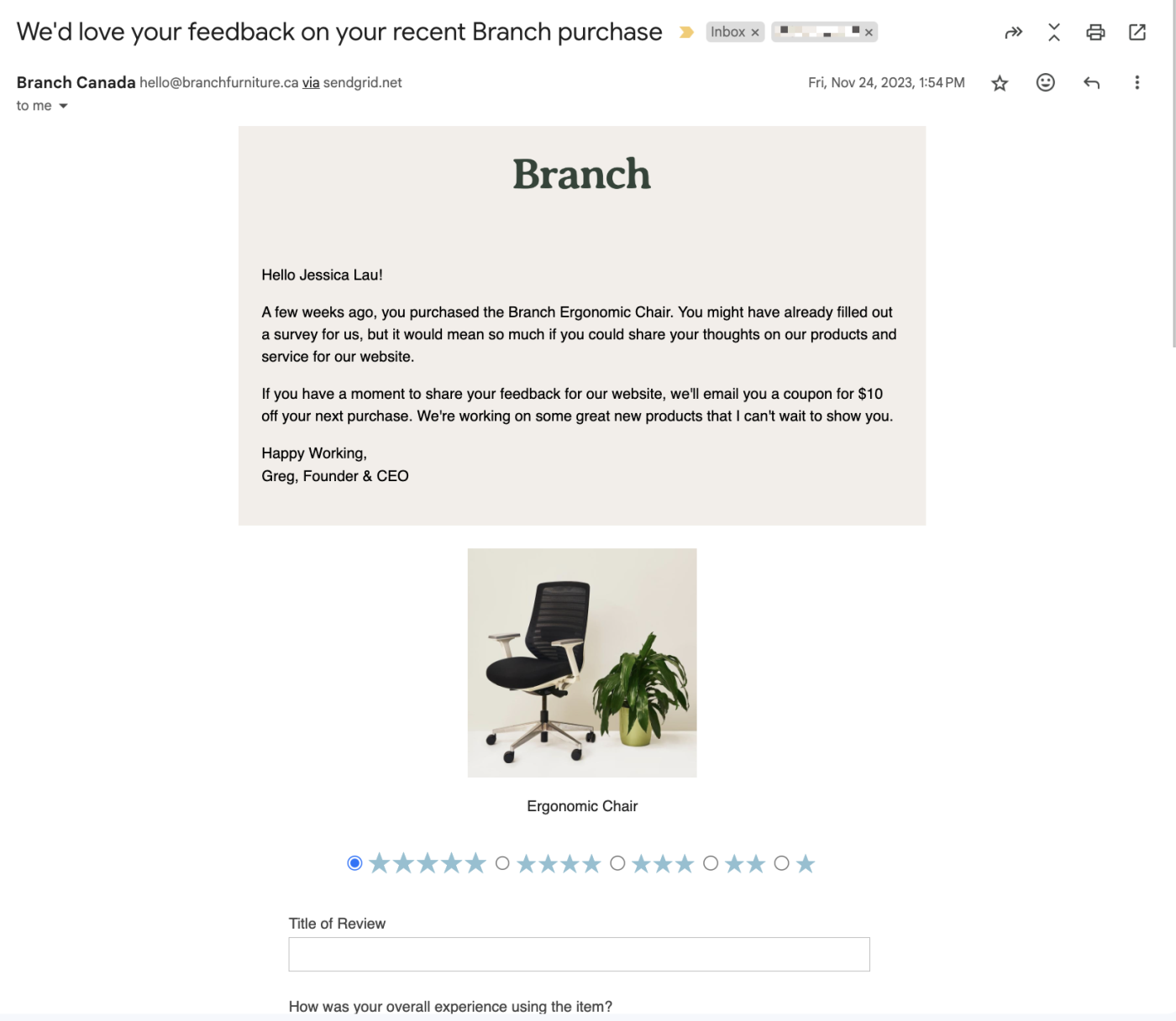
You might also send a request for feedback when someone cancels their subscription. That’s what the founder of Le Sweat (an at-home fitness app) did when I canceled mine. The email doesn’t include a financial incentive to share my feedback, but the copy sounds so human—as if the founder herself is asking me how the company can improve—that I still want to answer the poll.
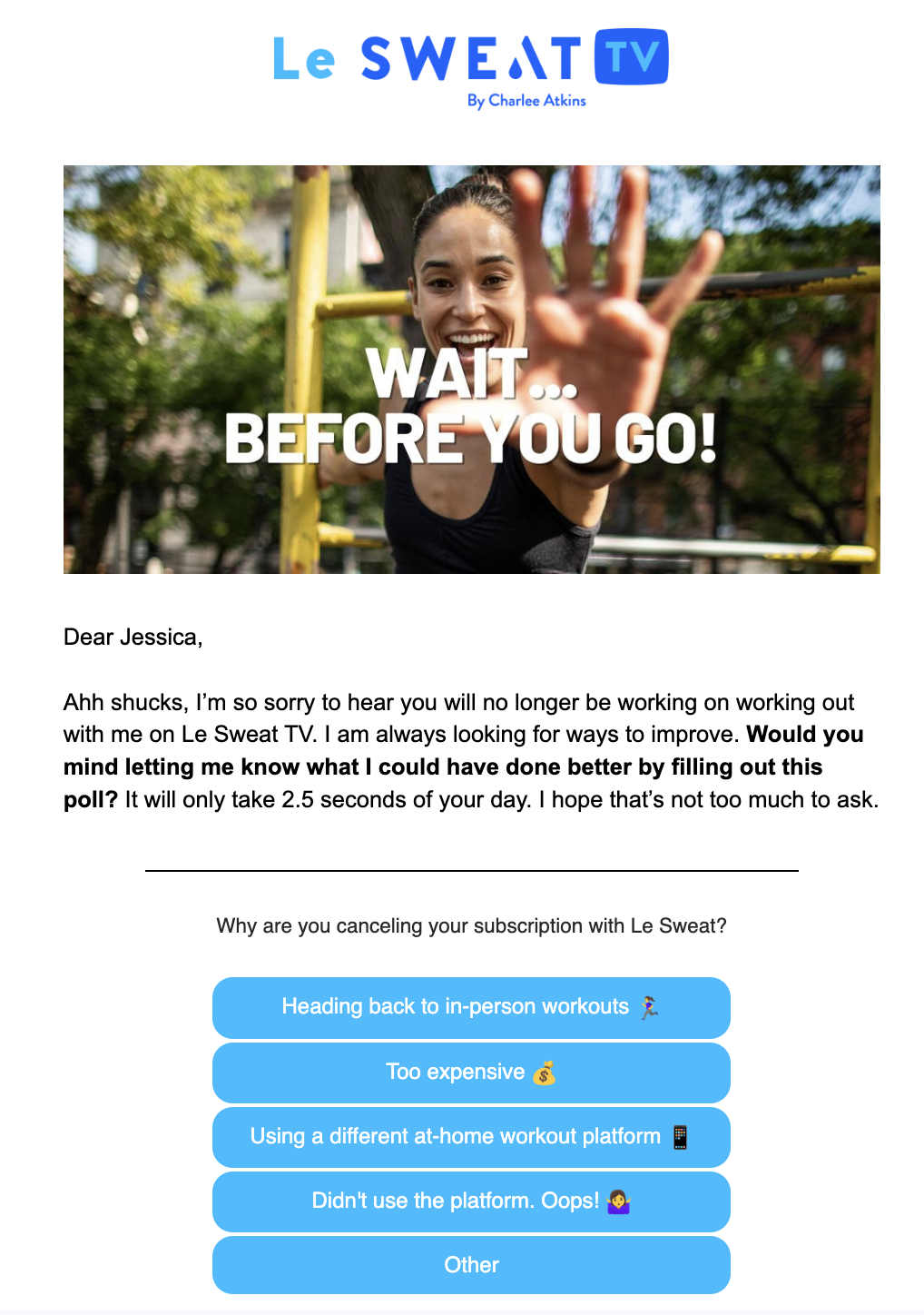
Loyalty and rewards email marketing examples
Loyalty and rewards emails are a great way to make your customers feel valued and encourage them to stick with your brand. Unlike other transactional emails, these types of emails aren’t directly triggered by a customer action. Instead, they’re triggered by a milestone, like an anniversary or reaching a new reward level.
For example, the video game company Nintendo uses these emails to notify users about their My Nintendo reward points balance, along with a CTA to redeem them.
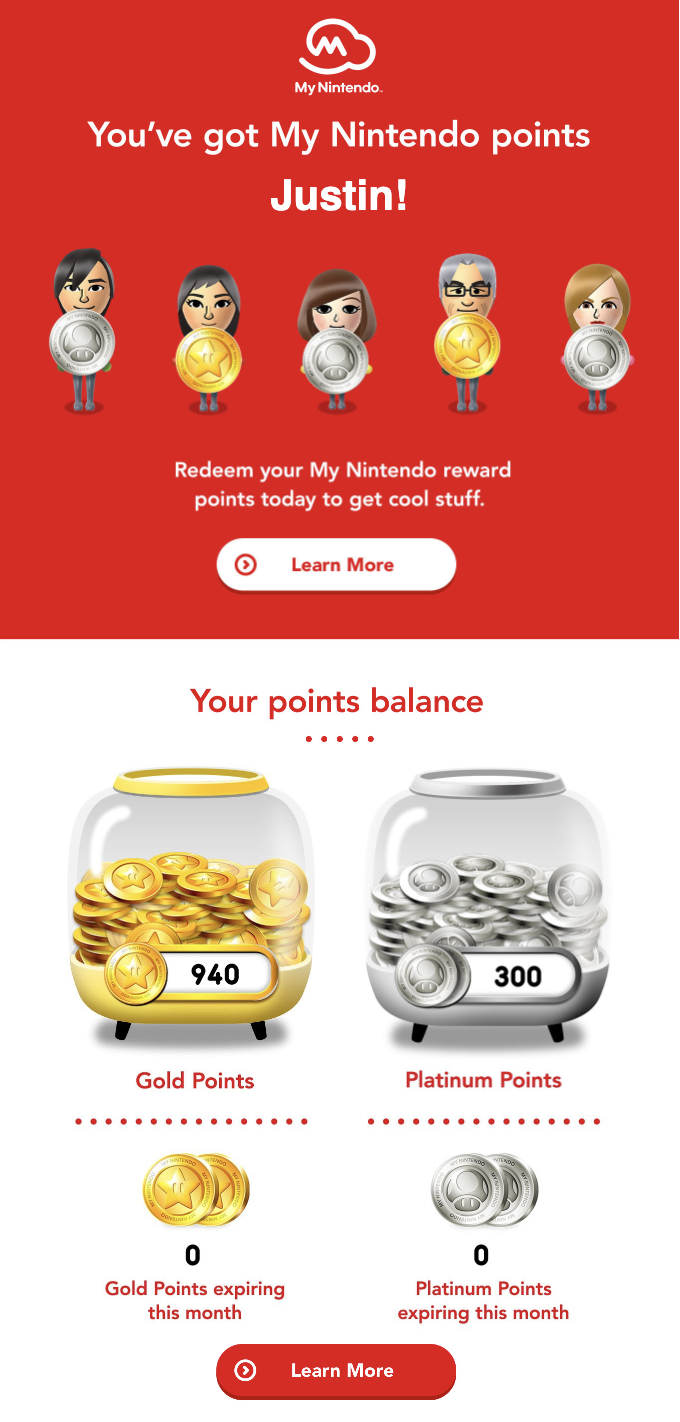
The loyalty emails I prefer to receive are the ones that require me to put in the least amount of effort (ideally zero) to get the most reward. Take Starbucks‘ annual birthday treat email, for example. For doing nothing other than existing—and creating a Starbucks account—I’m rewarded with a free drink or food item of my choice. It’s a small thing, but it works.
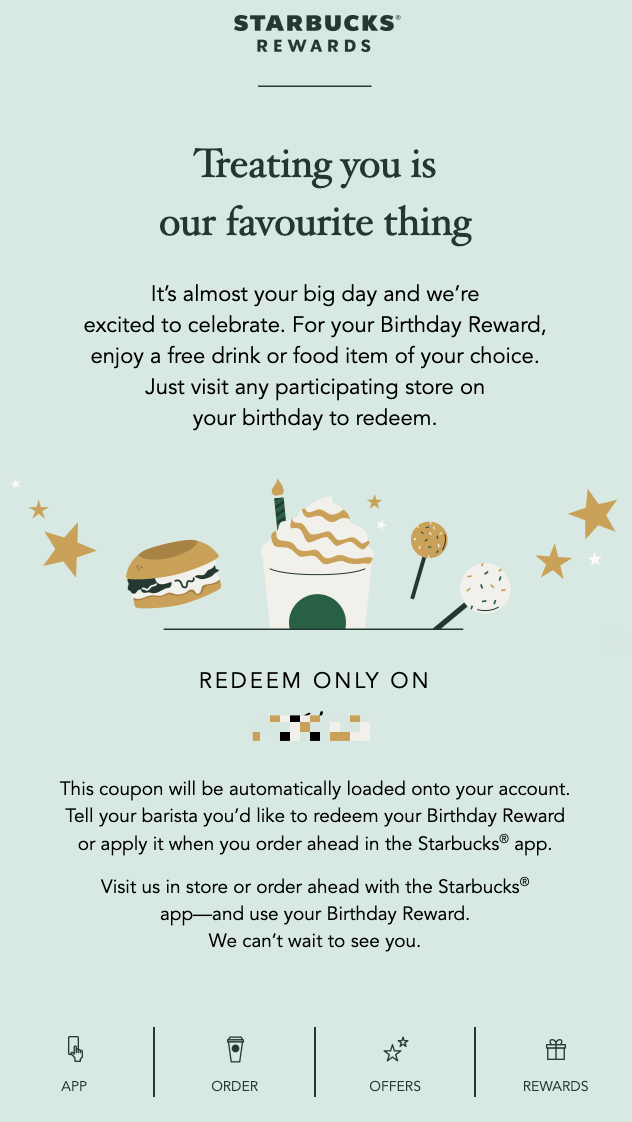
Company updates email marketing examples
Company updates allow you to give customers a behind-the-scenes peek into your organization and develop a deeper connection with your brand.
The chocolate company that I love—Chocolat de Kat—temporarily closed its storefront this past summer due to a change in partnership and subsequent renovations. And it shared as much in this update email.
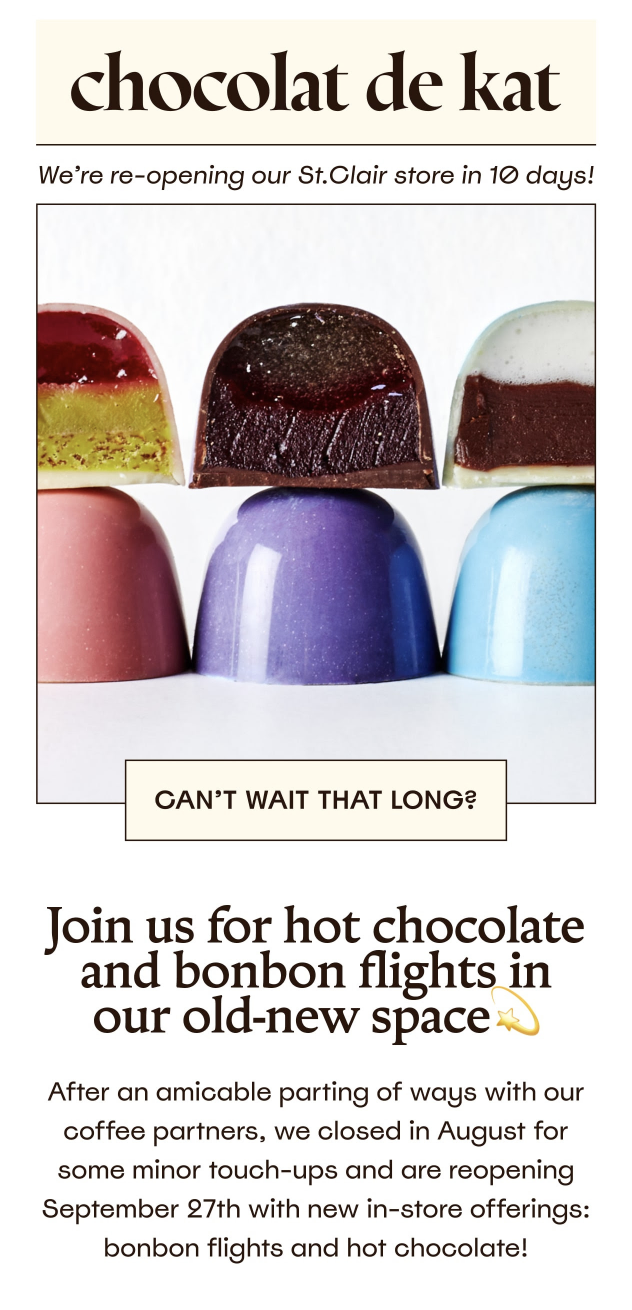
More importantly, they used the email update to announce their store re-opening and thank customers for their support. They even added a QR code to present at the re-opening for a free treat.
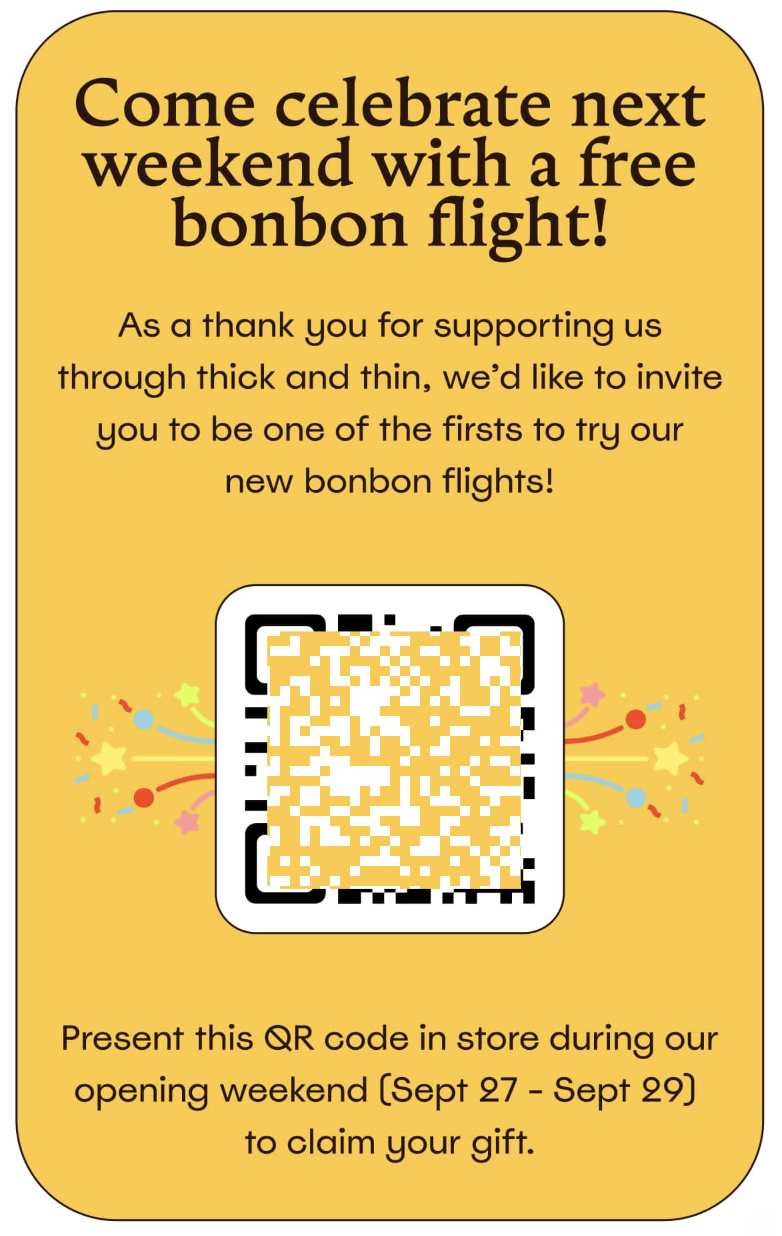
Media features also provide great content that you can leverage in your email marketing campaigns. That’s what Recreation.gov—the United States’s travel planning and reservation system—did when their app was featured on the Today Show. They also added the recognizable Today Show logo to add social proof to their message.
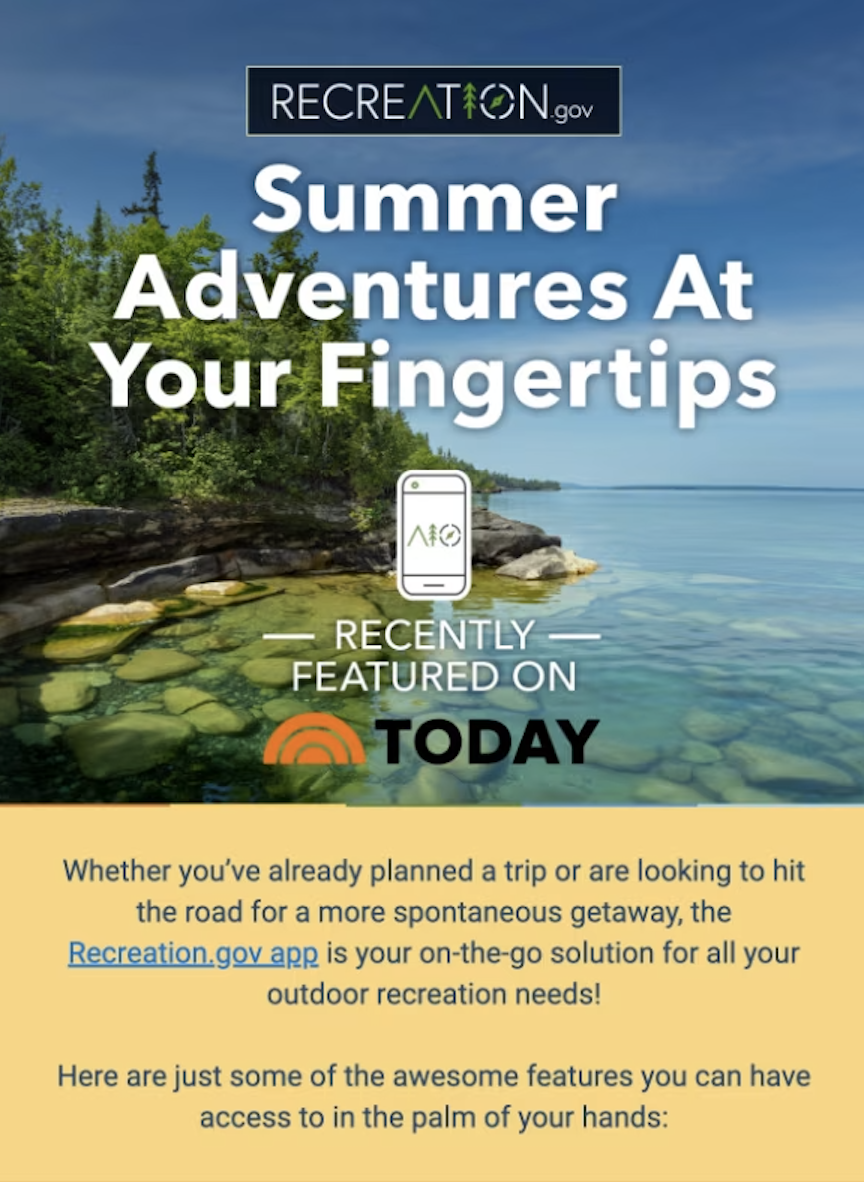
Event marketing email examples
If you use events, like webinars and conferences, to market your brand and reach new audiences, it’s a good idea to promote them over email. These types of emails usually take the form of a drip campaign, including an announcement and registration reminders to give audiences ample opportunities to sign up.
Take this event announcement for ZapConnect—Zapier’s annual user conference. It includes a striking visual of a countdown to remind subscribers that the conference is only days away, key details about the event (date, time, and location), and a clear CTA (“Save your spot”).
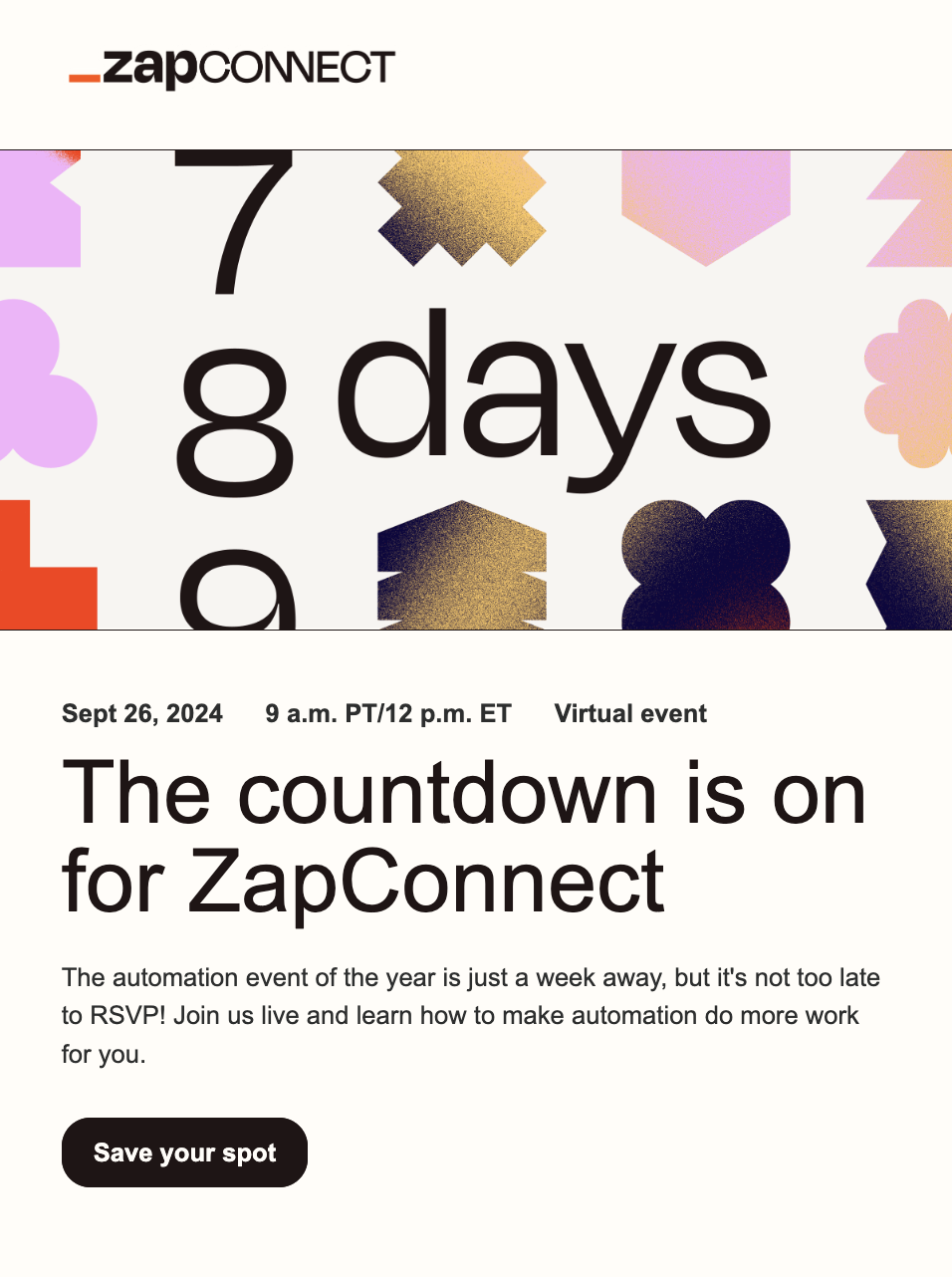
You can also leverage social proof from past attendees in your event marketing emails. That’s what the email and marketing automation platform ActiveCampaign did to promote their two-day event, Study Hall.
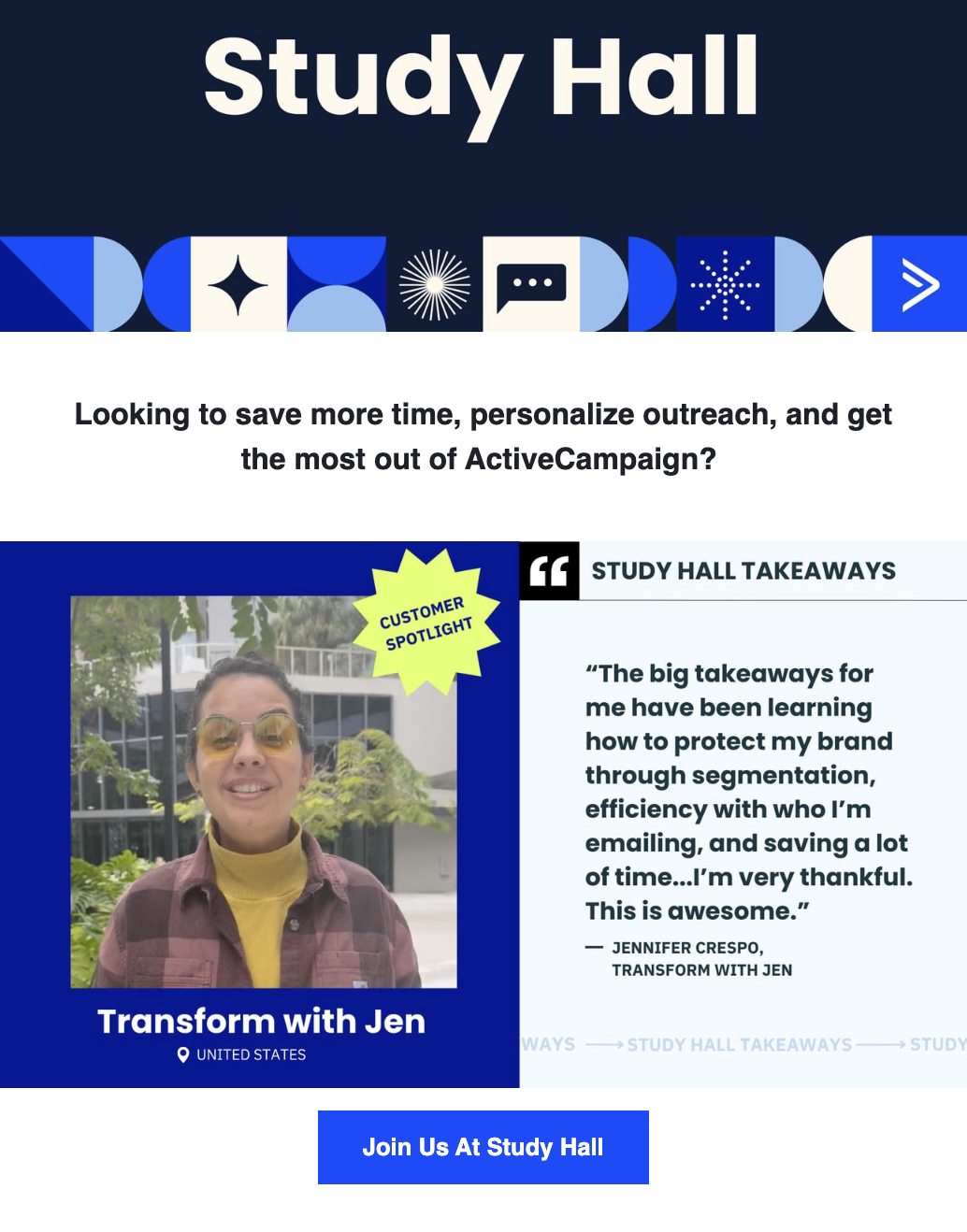
Email marketing ideas are everywhere
Constantly creating is tough, but you don’t have to go about it alone. Here are a few more places you can look to get out of that inspiration slump:
-
Subscribe to newsletters and product updates from other organizations outside of your own industry.
-
Try a new approach: use story-based email marketing.
-
Join digital marketing Slack groups to learn about new email campaign ideas.
And once you have your ideas ready, use automation to put your email marketing on autopilot. Learn more about how to automate your email marketing workflows.
Related reading:
This article was originally published by Steph Knapp in August 2022. The most recent update was in September 2024.







